




BY PETER JESSERER SMITH
INDIANAPOLIS (OSV News) –
As five days of the National Eucharistic Congress concluded with one final revival and a beautiful solemn Mass in Lucas Oil Stadium – Bishop Andrew H. Cozzens of Crookston, Minnesota, board chairman of the National Eucharistic Congress Inc., stood in Lucas Oil Stadium.
“I have a question for you,” he told the crowd. “This is the 10th National Eucharistic Congress – do you think we should do an 11th one?”
Some 60,000 congress participants – representing 50 U.S. states, 17 countries, and various Eastern and Western churches, and speaking over 40 languages – cheered wildly in the stadium.
They also again rose to their feet to give the U.S. Catholic bishops an enthusiastic standing ovation for making possible the five-day congress with its impact sessions, breakout sessions, special events, revival nights with Eucharistic adoration and Benediction and beautifully celebrated reverent Masses.
The event reflected the diversity

of a church all united in the same Eucharistic Lord and eager to use their gifts for a new Pentecost in the church.
The first day of the July 17-21 congress began with an evening revival as the 30 perpetual pilgrims, who had walked the four National Eucharistic Pilgrimage routes, took their final official steps of their eight-week journey into the stadium carrying icons of each route’s respective patron saints – St. Juan Diego Cuauhtlatoatzin, St. Junipero Serra, St. Elizabeth Ann Seton and the Blessed Virgin Mary – that were put around the altar where the Blessed Sacrament was placed.
“How will we know that we are experiencing Eucharistic revival?” Cardinal Christophe Pierre, the papal nuncio to the U.S., asked in his keynote speech July 17, encouraging everyone to surrender their hearts to the Lord over the next few days. “When we are truly revived by the Eucharist,” he said, “then our encounter with Christ’s real presence
Continued on page 6
BY RHONDA SWITA
TUPELO – On July 20, 2024, Dr. Hosffman Ospino, a highly recognized Professor of Theology from Boston College, spoke at St. James Church in Tupelo. St. James is blessed to have a diverse community of believers. Dr. Ospino’s message was one of unity and hope, focusing on us being a community of many families, one church and one faith.
Dr. Ospino gave those present at the event a history lesson on the evolution of Catholicism during the earlier days of American life, although mindful that Catholics were present in the country since the sixteenth century. In
the early 1800’s there was only one bishop and about 400 churches. But within the next 150 years, many large groups of various nationalities arrived, bringing their own sweat labor and priests. As a result, approx. 20,000 churches were built. Soon to follow were 13,000 Catholic schools, more than 300 Catholic Universities, and many hospitals and other social service organizations. Each nationality pretty much stayed to themselves, building community in their own language, and avoided co-mingling among groups to preserve identity.
However, as the older generations passed on, the newer generations adopted the English language and people became part of the “melting pot” of American culture. People had work and the children were being educated in the Catholic faith. Catholic families were strong in their Catholic faith. By 1950 there were about 30 million Catholics in the United States.









CATHOLIC ENGAGED ENCOUNTER – CEE is our diocesan marriage prep program for couples preparing for the sacrament of marriage. The upcoming weekends for 2024/2025 are: Oct. 11-13 at Camp Garaywa in Clinton; Feb. 21-23, 2025 at Camp Garaywa in Clinton; April 26-27, 2025 at Lake Tia O’Khata in Louisville; August 1-3, 2025 at Camp Garaywa in Clinton; and Oct. 24-26, 2025 at Camp Garaywa in Clinton. Register at https://bit.ly/CEE2024-2025. Details: email debbie.tubertini@jacksondiocese.org.
JACKSON – St. Richard, “Inspire” – a day retreat for women of all ages, Saturday, Nov. 2 from 8:30-3:30 p.m. in Foley Hall. Details: church o ce (601) 3662335.
OFFICE OF CATHOLIC EDUCATION – The OCE hosts a Zoom Rosary the first Wednesday of each month during the school year at 7 p.m. Please join us as we spotlight each school. On Sept. 4th, Cathedral School in Natchez will lead us in prayer. Join early and place your intentions in the chat. Details: Join the rosary via zoom at https://bit.ly/zoomrosary2024 or check the diocese calendar of events.
CLARKSDALE – St. Elizabeth, Annual St. Elizabeth Fair, Tuesday, Sept. 24 from 5:30-8 p.m. Enjoy the traditional spaghetti dinner at the school and enjoy prize booths and more. Details: church o ce (662) 624-4301.
FLOWOOD – St. Paul Early Learning Center, Annual Golf Tournament, Friday, Sept. 20 at Bay Pointe Golf Club. Save the date!
GREENVILLE – St. Joseph, 110th Annual St. Joseph’s Parish Fair, Tuesday, Sept. 10. Dine-in 5-8 p.m. and Take-out 4-6 p.m. Spaghetti tickets are $15 per person; $1 ra e tickets and $100 tickets for sale at the school and church o ce. Details: church o ce (662) 335-5251.
HERNANDO – Holy Spirit, Fall Bazaar, Saturday, Sept. 14 from 9 a.m. to 3 p.m. Enjoy games, raffles, slient auction and more at the annual bazaar. Details: Julie at julieeastefanik@gmail.com.
Holy Spirit, 150th anniversary of the School Sis-
ters of St. Francis, Friday, Oct. 4 at 6 p.m. Mass with Bishop Kopacz, followed by fellowship dinner. Details: church o ce (662) 429-7851.
Holy Spirit, Men’s Association Fish Fry, Friday, Sept. 27 from 4-7 p.m. Includes catfish, hushpuppies, fries, slaw, drink and dessert. Eat in or take-out. Cost: $13 adult plate; $6 kids plate. Details: Jon at (901) 481-0228.
JACKSON – Christ the King, Parish Picnic, Saturday, Sept. 21. Save the date!
JACKSON – St. Richard, Special Kids Golf Tournament, Thursday, Oct. 10 at Deerfield Golf Club in Canton. Morning and afternoon scrambles available. Details: for more information visit https://saintrichard.com/special-kids-day or email golf@saintrichard.com.
MADISON – The Catholic Foundation, Bishop’s Cup Golf Tournament, Thursday, Sept. 12 at Lake Caroline Golf Club. Lunch at 12 p.m.; tee-time 1 p.m.; dinner at 6 p.m. at the Mermaid Cafe. Cost: $200 for individuals. Register at https://bit.ly/2024BishopsCup. Details: contact Rebecca at (601) 960-8477 or rebecca. harris@jacksondiocese.org.
NATCHEZ – Cathedral School, Fall Festival, Oct. 5 and 6. Save the date!
OLIVE BRANCH – Queen of Peace, Church Picnic, Sunday, Sept. 22 from 11:30 a.m. to 2:30 p.m. Enjoy games, free food and fellowship. Be sure to bring a lawn chair. Details: church o ce (662) 895-5007.
Queen of Peace, Men’s Club Golf Tournament, Sunday, Sept. 29 at 1 p.m. Cost: $125 per player. Details: church o ce (662) 895-5007.
SOUTHAVEN – Christ the King, Fall Festival, Saturday, Oct. 5. Save the date!
TUPELO – St. James, Catechesis of the Good Shepherd Level I Formation Course, beginning Aug. 23. Long weekend format (Friday through Sunday) with dates in Aug., Sept., Oct., Nov., and concluding in Jan. 2025. Course cost: $500 per participant; discounts available for parishes sending more than three participants. Details: contact Karen Mayfield,
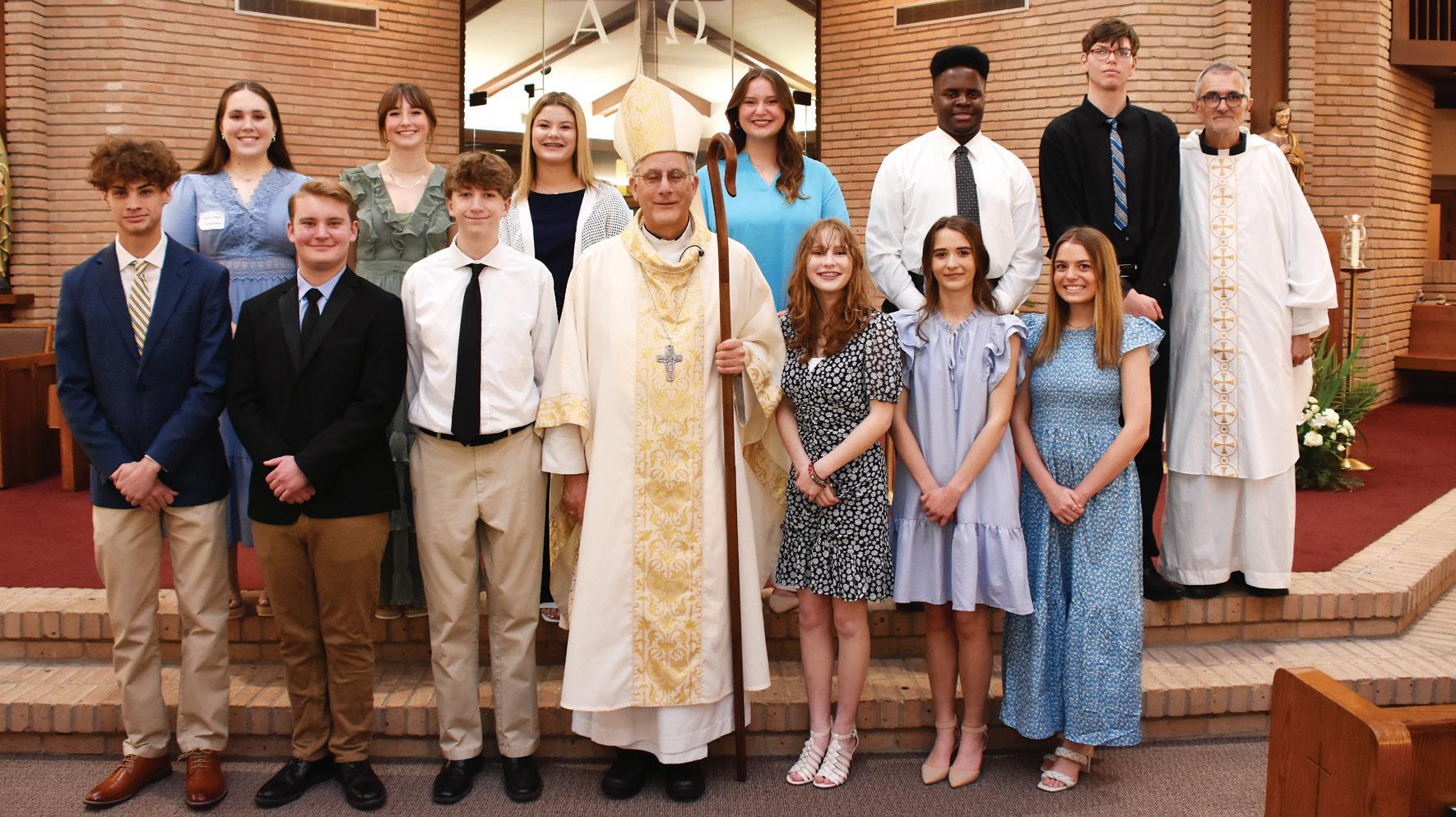
karen@stjamestupelo.com for course brochure and further information.
DIOCESE – Upcoming events: Middle School Retreat for seventh and eighth graders, Oct. 5-6, 2024 at Lake Forest Ranch, Macon. Diocesan SEARCH Retreat for tenth through twelth graders, Jan. 17-19, 2025 at Camp Wesley Pines, Gallman. Diocese High School Confirmation Retreat, Jan. 25-26, 2025 at Lake Forest Ranch, Macon. Diocese Catholic Youth Conference – DCYC for ninth through twelth grades, March 21-23, 2025 at the Vicksburg Convention Center. Details: contact your individual parish o ces or contact Abbey at (601) 949-6934 or abbey.schuhmann@jacksondiocese.org.


BY BISHOP JOSEPH R. KOPACZ, D.D.
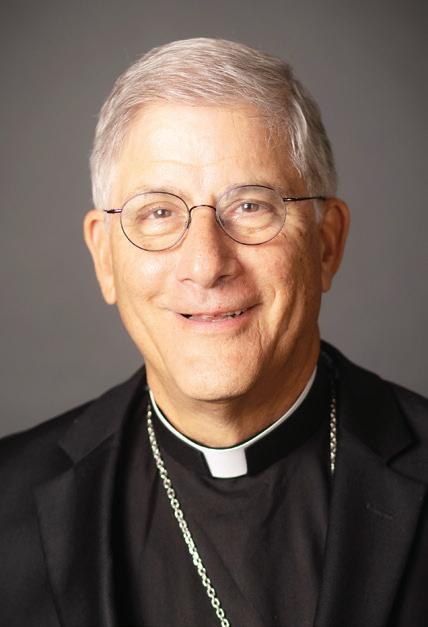
As we go deeper into the month of August the waves of a new year of ministry around the diocese roll onto the shores of our schools, parishes and social services. Not all programs and services begin at the same time, but by mid-September all are at high tide. Our Catholic Schools are going on all cylinders by the first week in August, in step with our four Early Learning Centers that serve over 12 months. Catholic Charities does not close its doors at any point in the year, but a new school year requires a higher engagement for programs that serve children and youth. Likewise, the lights in our churches continue to burn brightly over 52 weeks, but with the onset of fall, parish ministries are in high gear.
From the Cathedra of the bishop at the center of the diocese it’s captivating to take a long, loving look at the diocesan network that has so many levels and levers. Earlier this month I had the privilege of making a mission appeal on behalf of the diocese in Keene, New Hampshire. Of course, wherever and on whatever weekend an appeal is conducted, the scriptures always lead the way.
On the 19th Sunday in Ordinary Time on Aug. 10-11 the Bread of Life Discourse in chapter 6 of St.
John’s Gospel was reaching toward its apex. “I am the bread of life…I am the living bread that came down from heaven; whoever eats this bread will live forever; and the bread that I will give is my flesh for the life of the world.” (John 6:48-51)
The Lord’s words echoed far and wide that weekend, not only in New Hampshire and Mississippi but everywhere in the world where the Catholic Church gathered. In other words, at the heart of Jesus’ discourse is the Eucharist where we consume his body and blood, as well as his words. We celebrate our unity and identity, for we are one, holy, catholic and apostolic church; (Nicene Creed) there is one faith, one Lord, one baptism, one God who is Father of all and dwells in all. (Ephesians 4:4-5)
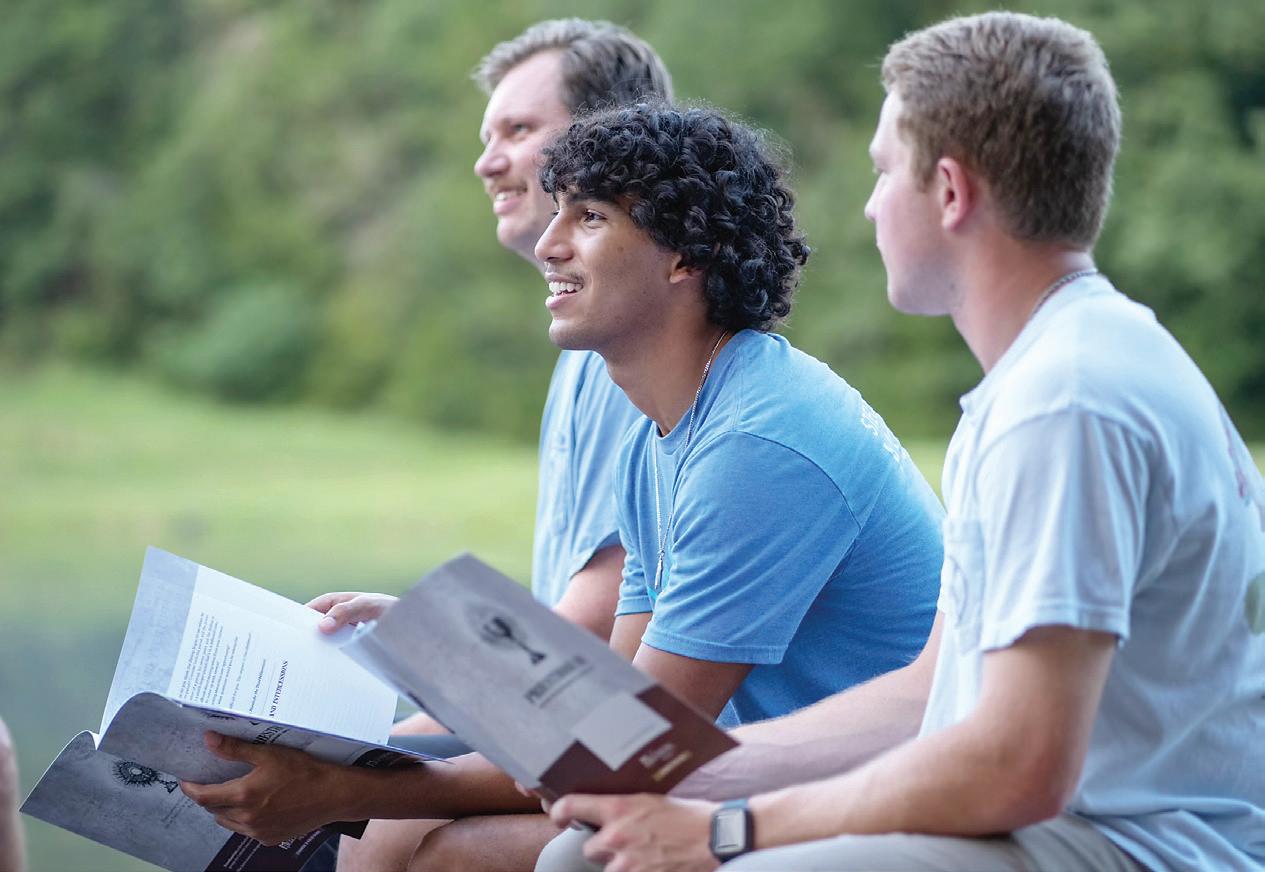
CARLISLE, Miss. – Seminarians EJ Martin, Francisco Maldonado and Joe Pearson get ready for the beginning of a new year in their formation at the annual seminarian convocation with Father Nick Adam. (Photo courtesy of Father Nick Adam)
However, flowing from this unity is amazing diversity. The church and the gospel are implanted in a particular place, time and culture, and just in our country alone there are significant di erences in each region and, for that matter every state. On mission appeals, it is a joy for me to brag on the Diocese of Jackson and over 10 years I have spoken in catholic parishes from Wisconsin to Florida, from New Hampshire to California.
August 5
Msgr. Elvin Sunds Retired
August 14
Father AnthonyClaret
Onyeocha St. Joseph Woodville & Holy Family Gloster
August 16 - 50 years
Father Joe Dyer Retired
The CARA study undertaken during our Pastoral Reimagining process confirmed that Catholics in the Diocese of Jackson make up 2-3% of the state’s population. Demographics as well as geography, history, climate, education and many other factors coalesce to create the conditions for
September 15
Father Bill Henry Retired
Thank you for answering the call!





P.O. Box 2130 Jackson, MS 39225-2130
Phone: 601-969-3581 E-mail: editor@jacksondiocese.org
Volume 70 Number 16 (ISSN 1529-1693)

Publisher Bishop Joseph R. Kopacz
Communications Director Joanna Puddister King
Production Manager Tereza Ma
MISSISSIPPI CATHOLIC is an official publication of the Diocese of Jackson, 601-969-1880, 237 E. Amite St., Jackson, MS 39201. Published digitally twice per month January – April and September – December; once per month June, July and August. Mississippi Catholic mails 14 editions per year – twice per month in December and January; and once per month February –November. For address changes, corrections or to join the email list for the digital edition, email: editor@jacksondiocese.org. Subscription rate: $20 a year in Mississippi, $21 out-of-state. Periodical postage at Jackson, MS 39201 and additional entry offices. POSTMASTER: Send address changes to Mississippi Catholic, P.O. Box 2130, Jackson, MS 39225-2130. Website: www.mississippicatholic.com www.jacksondiocese.org
evangelization and a host of ministries. Those who genuinely love the Lord and care to see the church thrive are eager to understand the Diocese of Jackson, its accomplishments and challenges as Catholic Church in Mississippi. Many have never lived, traveled or visited the Magnolia State, but after one Mass two weeks ago a gentleman informed me that he was born in Yazoo City. Usually, our sisters and brothers in the faith respond generously when they hear how their contributions will assist parish, school and service ministries.
At this time of year, especially with the unfolding of many ministries and activities it is especially gratifying to share our story of faith during the Mass, our great prayer of thanksgiving. “With Saint Paul may we be confident that the Lord who has begun a good work in us, will bring it to completion on the day of Christ Jesus.” (Philippians 1:6)
Tuesday, Aug. 27 and Sept. 10, 7:30 a.m. – Mass, Carmelite Monastery, Jackson
Friday, Aug. 30, 6:30 p.m. – St. Joe Bruins v. Clinton Christian Academy Football Game, Bill Raphael Field, Madison
Thursday, Sept. 12, 12 p.m. – Bishop’s Cup Golf Tournament, Lake Caroline Golf Club, Madison
Sunday, Sept. 15, 10 a.m. – 75th Anniversary Celebration and Mass, St. Francis, New Albany
Sunday, Sept. 22, 11 a.m. – Red Mass, St. John, Oxford
Wednesday, Sept. 25-29 – Mission Trip, Saltillo, Mexico
Friday, Oct. 4, 6 p.m. – 150th Anniversary of founding of the School Sisters of St. Francis, Holy Spirit, Hernando
Sunday, Oct. 6, 10 a.m. – 100th Anniversary Celebration and Mass, Our Lady of Victories, Cleveland
Saturday, Oct. 12, 6 p.m. – Homegrown Harvest Fundraiser for Jackson Seminarians, Two Mississippi Museums, Jackson
All events are subject to change. Check with parishes for further details.

I need to pray for more vocations, and I ask for you to do the same.
Our seminarians are ‘back in school’ and we have six excellent candidates for the priesthood studying for our diocese. Will Foggo is our most-senior man this year. Will is scheduled to be ordained a deacon next December and ordained a priest in the spring of 2026. Two years behind him are Grayson Foley and EJ Martin, and a few years behind them are Wilson Locke, Francisco Maldonado and Joe Pearson.
All six of these men are precisely the type of men who we need to be considering the priesthood, but the fact is, we could use more. Our parishes and parishioners benefit when they have a full-time resident pastor, and we know that, with our current numbers, this is not possible in many parts of our diocese. We also know that many of our priests are ‘working multiple jobs,’ and this is not ideal when it comes to pastoral planning and working with the people of the parish. We are a mission diocese, to be sure, but I believe that the Lord will provide us with the priests that we need, and I pray that he will put a distinct call on the hearts of many young men to follow that call this year.
Every Monday of this ‘school year,’ from August through May, I
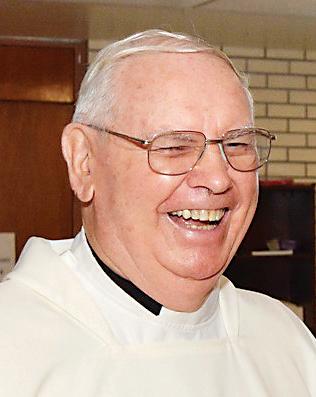
am planning on offering a votive mass ‘for an increase in priestly vocations.’ This is one of the masses that is available to all priests on any day that isn’t a special feast day or a Sunday. Please encourage your pastor to consider if he could do the same. The mass is our greatest font of grace and the Lord will hear our prayers united to the sacrifice of the mass.
What else can you do this school year to pray for more vocations? Will you commit to offering a rosary for priestly vocations once a week? Or going to daily mass and offering your own intention to the Lord asking for more priests? Maybe you will offer an intention in your morning or evening prayers asking the Lord to bless us with more help at the altar. However you decide to do it, please make it a priority in your prayers. Our seminarians reminded me during our summer gathering earlier this month that prayer is the number one way to increase vocations. If we are not people of consistent prayer, asking the Lord of the harvest to send our laborers for his harvest, then nothing else we seek to implement will bear fruit.
So please, pray for an increase in priestly vocations. I know that the Lord will hear our prayers and will bless us. I hope that he will bless us with a grand abundance of applicants very soon, but I also trust that he knows what we need, and he only asks us to be faithful.
– Father Nick Adam, vocation director
(Father Nick Adam can be contacted at nick.adam@jacksondiocese.org.)
BILOXI – Msgr. James Patrick McGough, 91, of Biloxi, passed away on Aug. 12, 2024.
Msgr. McGough was born July 24, 1933 in Rathagan, County Kildare, Ireland. His ecclesiastical studies were at Mungret College in Limerick, Ireland and at St. Bernard Seminary, St. Bernard, Alabama. He was ordained to the priesthood for the Diocese of Natchez-Jackson at St. Mary Basilica on May 25, 1957.
On Sept. 2, 1957, He was assigned to Nativity Parish in Biloxi and in September 1958, he entered Catholic University in Washington, DC to study canon law. In 1961, he was appointed as assistant chancellor and defensor vinculi (Defender of the Bond) and in 1962, he was appointed a diocesan chancellor. He was named Papal Chamberlain by the Holy See in 1965 and in 1966, he was appointed vicar general for the diocese. In 1969, he was named an honorary Prelate of His Holiness. Msgr. McGough was appointed as pastor of Sacred Heart Parish, Canton on Jan. 15, 1971 and later that year was appointed diocesan consultor. On Dec. 1, 1971, he was appointed as pastor of Sacred Heart Parish in Hattiesburg where he also served as the dean of deanery V and episcopal vicar.
On June 6, 1977, he was appointed as the chancellor for the newly established Diocese of Biloxi and in 1979 was appointed as pastor of St. Paul Parish in Pass Christian. In 1980, he was named vicar general for the diocese and in 1985, was appointed as pastor of Our Lady of the Gulf Catholic Church in Bay St. Louis. In 1988, he was appointed as pastor of St. Charles Borromeo parish in Picayune, and then served as pastor of St. James parish in Gulfport. His last parish assignment was at St. Clare parish in Waveland before his retirement from active ministry.
Msgr. McGough was a brilliant scholar in church law and policies. His infectious laugh could light up any room he entered. His homilies were always theology based and were delivered with the utmost reverence to the Gospel and the importance of the Eucharist. Msgr. McGough was truly a man of God and will be greatly missed. His contributions to the Dioceses of Biloxi and Jackson will be remembered for generations.
He was preceded in death by his parents, James Joseph McGough and Margaret Stack McGough; 2 brothers, Peter McGough and Gerard McGough; and a sister, Mary O’Grady.
He is survived by a brother, Rev. William “Bill” McGough; and numerous nieces and nephews in Ireland and England.
A Mass of Christian was celebrated by Bishop Louis Kihneman and other priests at on Wednesday, Aug. 21 at Our Lady of Fatima Catholic Church in Biloxi. Interment will be in St. James Cemetery, Gulfport.
In lieu of flowers, please make memorials to the Association of Priests, 237 E Amite Street, Jackson, MS 39201.
The Diocese of Jackson has launched a third-party reporting system that will enable all diocesan employees, volunteers and parishioners to anonymously (or named if preferred) make reports. Examples of this activity include fraud, misconduct, safety violations, harassment or substance abuse occurring at a Catholic parish, Catholic school or at the diocesan level. The system is operated by Lighthouse Services.
To make a report visit www.lighthouse-services.com/ jacksondiocese or call 888-830-0004 (English) or 800-2161288 (Spanish).
The Association of Priests of the Dioceses of Jackson and Biloxi provide a small pension to our retired priests. As you consider your estate plans, please remember these faithful servants by making a donation or leaving a bequest to the Association of Priests. Our parish priests dedicate their lives to caring for us, their flocks. Let us now care for them in their retirement. Donations can be made payable to the Association of Priests and can be mailed to: Diocese of Jackson, P.O. Box 22723, Jackson, MS 39225-2723
By Father ron rolheiser, oMi
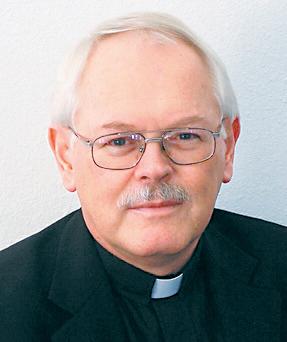
Two roads diverged in a wood, and I –I took the one less traveled by, And that has made all the difference. Most of us are familiar with these words from Robert Frost which have been used countless times in graduation and commencement addresses and other inspirational talks as a challenge to not just follow the crowd, but rather to risk carrying yourself and your solitude at a higher level. Well, Jesus offers us that same invitation daily as we stand looking at two very different roads.
In the Sermon on the Mount, Jesus summarizes many of his key teachings. However, they are easy to misunderstand and rationalize. Mostly though we don’t pick up on what lies front and center in those teachings, that is, how our virtue must go deeper than that of the Scribes and the Pharisees. What’s at issue here?
Most of the Scribes and Pharisees were good, sincere, committed, religious people with a high virtue. They kept the Commandments and were women and men who practiced a strict justice. They were fair to everyone and indeed were extra gracious and generous to strangers. So, what’s lacking in this? Well, good as this is, it doesn’t go far enough. Why not?
Because you can be a person of moral integrity, fully just and generous, and still be hateful, vengeful and violent because these can still be done in justice. In strict justice you may hate someone who hates you, you may exact revenge when you are wronged, and you may practice capital punishment. An eye for an eye!
But, in doing that you are still doing what comes naturally. It is natural to love those who love you, just as it is natural to hate those who hate you. Real virtue asks more than this. Jesus invites us to something higher. He invites us to love those who hate us, to bless those who curse us, to never seek revenge, and to forgive those who kill us – even mass murderers.
Admittedly, that isn’t an easy road to take. Almost every natural instinct inside us resists this. What’s our spontaneous reaction when we are wronged? We feel vengeful. What’s our natural reaction when we hear that the gunman at a mass killing was killed? We feel relieved. What’s our natural reaction when an unrepentant murderer is executed? We feel happy he died; and we cannot help ourselves in that reaction. There’s the sense that justice has been served. Something has been righted in the universe. Our moral indignation has been assuaged. There’s closure.
Or is there? Not really. What we feel rather is emotional release, catharsis; but there’s a huge difference between catharsis and real closure. While the emotional release may even be healthy psychologically, we are invited (by Jesus and by all that’s highest inside us) to something else, to a road beyond feeling emotional release, namely, the less travelled road towards wide compassion, understanding and forgiveness.
In assessing this, it can be helpful to look at how Pope John Paul II addressed the question of capital punishment. He was the first pope in the Church’s two-thousand-year history to speak out against capital punishment. Interestingly, he didn’t say it
was wrong. Indeed, in strict justice it may be done. What he said was simply that we shouldn’t do it because Jesus invites us to something else, namely, to forgive murderers.
Easier said than done! When I hear of a mass shooting, my thoughts and feelings don’t naturally turn toward understanding and empathy for the shooter. I don’t agonize about how he must have suffered to bring himself to do something like this. I don’t naturally feel sympathy for those who because of fragile or broken mental health might do something like that. Rather my emotions naturally put me on the road more traveled, telling me that this is a terrible human being who deserves to die! Empathy and forgiveness aren’t the first things that find me in these situations. Hateful and vengeful feelings do. However, that is the road of our emotions, the road more taken. Understandable. Who wants to feel sympathy for a killer, an abuser, a bully?
But that’s only our emotions venting. Something else inside us is forever calling us to what’s higher, namely, to the empathy and understanding to which Jesus invites us in the Sermon on the Mount. Love those who hate you. Bless those who curse you. Forgive those who murder you.
Moreover, such virtue is not something we ever achieve once and for all. No. Faith works this way: some days we walk on water and some days we sink like a stone.
So, like Robert Frost, on any given day I find myself standing where two roads diverge. One, the road more traveled, invites me to walk the road of hate, vengeance, and feeling I am a victim; the other, the road less taken, invites me to walk the road of wider compassion, empathy and forgiveness.
Which one do I take? Sometimes one, sometimes the other; though always I know the one to which Jesus is inviting me.
(Oblate Father Ron Rolheiser is a theologian, teacher and award-winning author. He can be contacted through his website www.ronrolheiser.com.)
In times of trial know that nothing is impossible for God, pope says
By Cindy Wooden
VATICAN CITY
(CNS)
– Each Christian and the whole Catholic Church must hold fast to the promise that “nothing is impossible for God,” especially when facing difficulties, Pope Francis said.
Resuming his weekly general audiences Aug. 7 after a six-week summer break, the pope returned to his series of audience talks about the role of the Holy Spirit in the life of the church.
“Without the Holy Spirit, the church cannot keep moving, the church doesn’t grow, the church cannot preach,” he told pilgrims and visitors sheltered from the summer heat in the air-conditioned Paul VI Audience Hall.
Two women holding signs and shouting for the church to formally declare bullfighting a sin interrupted the reading of a passage from the Bible at the beginning of the audience. Security escorted them out of the audience hall.
Looking at how the Holy Spirit enlivens and assists the church, Pope Francis said people often wonder, “How is it possible to proclaim Jesus Christ and his salvation to a world that seems to seek only well-being in this world?”
The answer, he said, is given in the Acts of the Apostles: “You will receive power when the Holy Spirit comes upon you, and you will be my witnesses.”
Notice, the pope said, the words are almost the same as those the Angel Gabriel said to Mary when she asked how it would be
possible that she would conceive and bear God’s son.
“What is said about the church in general also applies to us, to every baptized person,” Pope Francis told the crowd. “In life, all of us sometimes find ourselves in situations beyond our strength, and we ask ourselves: ‘How can I cope with this situation?’ It helps, in such cases, to repeat to ourselves what the angel said to the Virgin: ‘With God nothing will be impossible.’”
The pope prayed that everyone would find the strength to keep going “with this comforting certainty in our hearts: ‘With God nothing will be impossible.’”
“If we believe this, we will perform miracles,” he said. “With God nothing will be impossible.”

'
people is a missionary and evangelizing people'
– Continued from page 1 –
in the sacrament opens us to an encounter with him in the rest of our life” and then “spills over in our daily life, a life of relating to others, our way of seeing others.”
Every day of the congress began with most congress-goers joining in beautifully and reverently celebrated Eucharistic liturgies in the stadium – including a July 20 Holy Qurbana, the Syro-Malabar form of the Eucharistic liturgy, prayed in English. Additional morning and evening Masses at nearby sites in different languages, such as Spanish or Vietnamese, or in different forms, such as the Byzantine rite or the older usage of the Roman rite.
Three days of the congress, July 18-20, were split between seven morning impact sessions and nearly 20 afternoon breakout sessions on a variety of topics meant to form, equip and inspire people, including clergy, to live more deeply their faith in light of Jesus making himself truly present in the Eucharist – and how to practically bring what they have learned into their parishes, ministries, groups and families.
The exhibit halls in the Indiana Convention Center were packed during the congress, as long lines formed for exhibits such as the Shroud of Turin or Eucharistic miracles. The convention center was also a place where the spontaneity of joy could be seen and felt. Young people marched through chanting their love for Jesus, while further on, a group of Catholic women, dressed in traditional apparel from Cameroon, sang and danced their love for Jesus and Mary to the delight of those gathered around them.
Congress-goers had the opportunity to attend off-site events such as The Catholic Project’s panel discussion July 19 that explored the challenges of navigating the dating landscape as Catholics.
Tens of thousands of congress-goers at the revivals – and the liturgies as well – eagerly joined their voices in singing the beautiful hymns and chants, both traditional and contemporary, in English, Spanish, Latin and other languages. The congress saw the musicianship of Dave and Lauren Moore, Sarah Kroger and Matt Maher, as well as the talents of the men’s ensemble Floriani and the Indianapolis Symphony Orchestra.
“The reverence was just awe-inspiring, and that’s something I would like to take back to our parish,” Deacon Robb Caputo of the Diocese of Peoria, Illinois, told OSV News.
The nightly revival sessions created a sensory experience of awe around the Eucharistic Lord, as tens of thousands prayed in silent contemplation before the Eucharist on the altar – illuminated in the dark stadium by spotlights. Adoring Jesus in the stadium, concluding with Benediction, was the pinnacle movement of each evening.
Keynote speakers and testimonies helped keep people’s eyes fixed on Jesus’ personal love for them and his desire to be close to them.
One such nightly revival, focused on healing, indicated the problem with Catholic belief in the Eucharist – was more about the heart than the head, and needed Catholics to repent of their indifference to Jesus.
“Knowledge can make us great, but only love can make a saint,” said Father Mike Schmitz, the Diocese of Duluth, Minnesota, priest known for chart-topping podcasts “The Bible in a Year” and “The Catechism in a Year.” Mother Olga of the Sacred Heart, who survived four wars in the Middle East, recounted how in the midst of her own personal suffering she heard Jesus say in her heart: “That even on the cross and through the cross, we can still choose to love.”
Jonathan Roumie, the actor famous for his portrayal of Jesus in the hit miniseries “The Chosen,”
told the audience at the final revival night July 20 after reading Jesus’ Bread of Life discourse from John 6, “The Eucharist for me is healing. The Eucharist for me is peace, the Eucharist for me is my grounding. The Eucharist for me is his heart within me.”
Murielle and Dominic Blanchard of Gallup, New Mexico, navigated the congress with six children aged 8 and under, including 20-month twins, and a baby on the way. They said the Catechesis of the Good Shepherd atrium was key for them, because it provided both formation for their older children and had space for the twins to play.
Throughout the congress, the historic and stately St. John’s Catholic Church across from the Indiana Convention Center’s main entrance fulfilled its role as a spiritual hub. A steady flow of pilgrims came and went from the main church during 24-hour adoration throughout the congress. It had times for silence as well as times geared toward families, where children were invited to get close to the Eucharist, put a flower in a vase near the monstrance, and just adore as beautiful, simple melodies lifted up the packed church in prayer.
More than 1,200 religious sisters and brothers, 1,170 priests, 630 deacons, 610 seminarians and 200 bishops participated in the congress, according to congress organizers. At a press conference July 19, Philadelphia Archbishop Nelson J. Pérez said he had never seen anything like the congress, as a non-papal event, in his 35 years of priesthood.
“You can sense the energy of what’s happening here, which is touching hearts,” he said, adding the experience was making him think about how to respond to the need for the church’s sacraments to be more accessible.
The highlight came July 20 as tens of thousands of Catholics followed behind the truck-pulled, flower-rimmed float carrying the Blessed Sacrament accompanied by Bishop Cozzens and Indianapolis Archbishop Charles C. Thompson. They walked 10 blocks from the convention center through downtown Indianapolis to the Indiana War Memorial Plaza for what Bishop Cozzens said “might be the largest Eucharistic procession in the country in decades.”
Nancy Leuhrmann of Cincinnati told OSV News the experience, which culminated in Eucharistic adoration and Benediction at the plaza, was “really wonderful, seeing all the people just quiet, reverent and joyful.” Leuhrmann said the security presence didn’t have much to do and she noted the officers thanked the crowd for making their jobs easy.
At the sending-forth Mass July 21, Pope Francis’ special envoy to the congress, Cardinal Luis Antonio Tagle, delivered a homily with warmth, joy and humor that made participants both laugh and feel inspired as he told them, “A Eucharistic people is a missionary and evangelizing people.”
“We should not keep Jesus to ourselves,” he said, exhorting them not to use their time in church to escape others, but to “share Jesus’ tender love” with “the weary, the hungry and suffering ... the lost, confused and weak.”
“Go and share Jesus’ gift of reconciliation and peace to those who are divided,” he said, emphasizing, “Let us proclaim Jesus joyfully and zealously for the life of the world!”
Bishop Cozzens revealed there would be another National Eucharistic Pilgrimage in 2025 from Indianapolis to Los Angeles, and possibly an earlier National Eucharistic Congress than 2033.
But he invited people to take this experience of the congress and – echoing Cardinal Tagle’s call for Eucharistic “missionary conversion” – join the congress’s “Walk with One” initiative.
“Commit yourself to walking with one person,” he said. “Commit yourself to becoming a Eucharistic missionary, someone who lives deeply a Eucharistic life, and having received that gift, allows themselves to be given as a gift.”
(Peter Jesserer Smith is national news editor for OSV News. Staff from OSV News, The Criterion and Simone Orendain contributed to this report.)
' Diversity ... is a gift'
– Continued from page 1 –
During the 1950s and 1960s, major social changes drove a significant number of Catholics away from traditional ways of being church. Immigration from Europe had slowed down and various cultural revolutions such as the women’s rights movement, new attitudes toward sexuality, and the Civil Rights Movement redefined Catholic life in America. More unfortunate attitudes such as the growing openness to treat the right to “end” life in the womb as a right took hold in our society. Many Catholics stopped practicing their faith. This trend was exacerbated in the early 2000s with the effects of the sexual abuse scandal of children by clergy. Mass attendance declined and thousands of churches and catholic schools have closed.
Although one may think that American Catholicism is in decline, actually the opposite is true. New immigrant Catholics primarily from Latin America, the Caribbean, Asia and Africa, and their U.S. born children, are giving new life to our Catholic communities. They seek Catholic communities to nurture their faith. Those communities already exist. We must build on the lessons from our past and embrace fresher ways to evangelize in the midst of the diversity that shapes American Catholicism to build up the kingdom God in our parishes.
At the talk, Dr. Ospino gave some insights on how to do this. 1) We must educate parents – teach them first, so they can teach their children. 2) Consider family faith formation initiatives. 3) Realize that being multi-cultural is a gift from God. Embrace it. That is who we are. 4) Acknowledge that bilingual communication is okay! Parents speak to their children in different ways. 5) All our pastoral efforts must lead to building communion: with God, with our church, with each other. 6) Practice Misa, Mesa, and Musa. Misa is an invitation to pray together. Mesa is a call to eat together! Nothing is more healing than eating together. Musa is a summons to celebrate together with in a spirit of fiesta! 7) Be attentive to what works well with Hispanic Catholics and other groups. Be open to learn how to be church from the communities that renew American Catholicism.
Dr. Ospino’s message can be summed up as follows: Diversity is not a problem. It’s a gift. Our priority is to facilitate an encounter with Christ. Evangelize and build up the kingdom of God and do it with joy!
(Rhonda Swita is the Director of Faith Formation for St. James parish in Tupelo.)

By Joanna Puddister King
JACKSON – August is recognized as national “make-a-will” month, an initiative aimed at raising awareness about the importance of estate planning. With less than one-third of Americans having a valid will, the Diocese of Jackson invites the community to take proactive steps in securing their future and their legacy using the free service – My Catholic Will.
“Creating a will can often feel like a daunting task, one that many of us tend to put off to do some time in the future,” says Rebecca Harris, director of the Office of Stewardship and Development for the Diocese of Jackson. “However, viewing this process from a different perspective might make it easier to approach. Think of creating your will as a way to establish a lasting legacy for your loved ones and even your Catholic faith.”
While many expect to live well into the future, not being legally prepared for the end could lead to significant issues. Ambiguous or absent final wishes could result in conflicts among beneficiaries. Those who die without a valid will risk having the distribution of assets decided by state law.
The Office of Stewardship and Development aims to simplify the process of estate planning for those across the diocese. In partnership with My Catholic Will, the diocese is offering a free online service that allows individuals to create a legal will in under 20 minutes in most cases. This service is available to everyone in the diocese and can be accessed by visiting https://mycatholicwill.com/jacksondiocese. The site also features a living will builder, enabling individuals to outline their medical wishes should they become unable to communicate or make decisions for themselves.
“Taking the time to create your will not only provides peace of mind but also helps secure your legacy,” Harris said.
Even those who currently have a will can take this month as a reminder to update their wills.
“I’ve had a will for decades now,” said Bishop Joseph Kopacz. “It continues to evolve as time goes on.”

In a recent video on “Make-a-Will” month, Bishop Kopacz emphasizes the importance of being intentional and mindful about what matters most to us. For those who are devoted to their faith, their parish, their school, and their diocese, a will provides numerous ways to support these commitments.
Additionally, the diocese also offers a free “Funeral and Financial Planner Guidebook” to assist in the estate planning process. For questions about wills or other planned gift options, Harris is available for assistance at rebecca.harris@ jacksondiocese.org.
National “Make-a-Will” month serves as a reminder to all individuals, regardless of age or wealth, to consider their estate planning needs and take the necessary steps to ensure their wishes are honored.
By galen Holley
Much like the French author Marcel Proust, in his multi-volume novel Remembrance of Things Past, it was a cookie that stood out in James McChesney’s mind as an intimate link to history.
“My wife, Sally, used to get up early on Sundays and bake six dozen cookies for the after-church social,” said McChesney,speaking of the old days, when he and Sally had to slap their children’s hands to keep them away from the baked during the drive to church.
“Snickerdoodle, chocolate chip, oatmeal raisin, English tea,” said McChesney. He was seated at a side table which made room for his walker. McChesney and several of his fellow parishioners, several of them octogenarians, were at the seventy-fifth anniversary celebration of St. Francis Church. It was held at the Union County Heritage Museum on June 29. More than sixty parishioners gathered to look over old photos, enjoy hors d’ourves, and to share stories about the church’s beginnings.
Francis. Greer was raised in the countryside and remembered several young seminarians visiting. The soon-to-be-priests enjoyed homemade biscuits, garden vegetables, and all the delicious, wholesome fare of an abundant, country table. Greer’s parents planted flowers, and women from the church used them in the May Crowning each year.

Greer was particularly fond of a hard working priest from the Glenmary Home Missioners named Bob Rademacher. Father Bob helped rural families pick cotton and do all manner of farm work. He wasn’t afraid to get his hands dirty.
At the celebration on June 29, former parishioners, who’d long since moved away, showed up for the event with pictures of great grandchildren in their wallets. Lorraine Turner was there. She was celebrating the memory of her mother and long-time member, Betty Lang, who passed in 2016.
ing and praying as always. Twin brothers Ronnie and Donnie Rosetti have been strong supporters and committed members for decades. Ronnie shook hands and hugged necks as is his usual custom.
“‘I want people to become Catholic, because I love this church,” he said.
A painting hangs in the fellowship hall at St. Francis Church on Highway 15. It’s a portrait of a demure, stately, tastefully dressed woman named Dorothy Kelso. Her name was on the lips of all the old-timers gathered at the museum on June 29. Kelso moved with her family to New Albany in 1922, and the first Mass was celebrated in the Kelso home, at 357 Garfield Street, in 1938. She’s considered the matriarch of St. Francis Church.
The portrait of Kelso serves as a reminder to a new generation who are carrying on the legacy of St. Francis of Assisi Parish.
A collage of sepia colored photographs passed on a projector screen. McChesney saw an image of himself. He beheld a much younger man, dressed in a Western style shirt, standing next to another of the old-timers, Ralph Hanskiewicz. Ralph and his wife, Bea, have been members of St. Francis for several decades.
Helen Roberts Greer also saw a younger version of herself on the screen. Born into the church in 1952, Greer grew up with seven siblings as a member of St.
Names rose up like prayers from conversations around the room. People remembered Bill and Shelia Towner, the artist M.B. Mayfield, musician Kerry Lynch, as well as Marion Coltharp. Faithful member Mary Goins’s son, Kelly, gave a moving testimonial about how the Catholic Youth Organization touched his life.
Sarah Pierce joined St. Francis some 30 years ago. She almost cried talking about her passion for the church.
“I love the Catholic Church,” Pierce said. “It’s the pinnacle of my heart.” Maxine Hall was there, help-
Parks Smith and his wife, Vance, are part of the younger set at the church. They have a big, old-fashioned Catholic family, five girls and one boy. Parks sings in the choir, and he dresses to a “t” every Sunday with a coat and tie. Smith is a convert from Protestantism, and he stood up and spoke from the heart at the celebration.
“I never imagined what a stepping stone this would be,” said Smith, a school teacher. “We seldom see how God is setting up things in our lives. A seed has been planted in my life. I’m deeply grateful for this church.”
(Galen Holley is a member of St. Francis of Assisi in New Albany.)






































































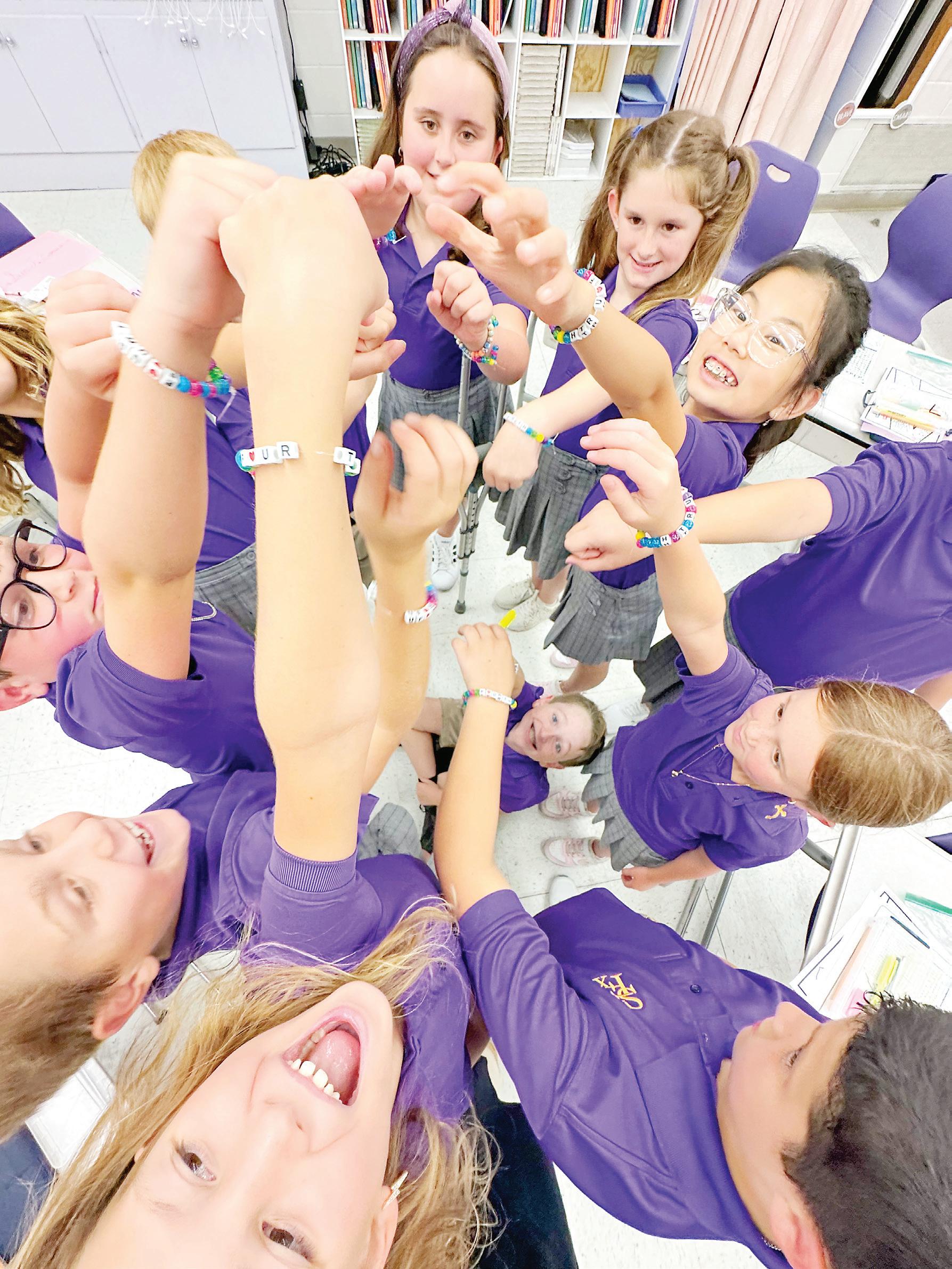
Fourth graders at Vicksburg Catholic School celebrate the start of the school year with bracelets. Pictured clockwise from top: Evvy Fletcher, Masry Massey, Adeline Sun, Mary Daves Karel, Kimber Miller, Emily Harper Averett, Charlie Reeder, Walt Karel, with Maverick Stubbs (in the center of the circle). (Photo by Anna Griffing)




Congreso eucarístico pide a católicos ‘Caminar con alguien’, evangelizar a través del ‘compañerismo espiritual’
Por Maria WierinG
INDIANÁPOLIS (OSV News) – Al final de la Misa de clausura del Congreso Eucarístico Nacional, el obispo Andrew H. Cozzens de Crookston, Minnesota, preguntó a la multitud de 60.000 personas reunidas en el estadio Lucas Oil el 21 de julio si tomarían su amor por la Eucaristía y la Iglesia, fortalecido durante los cinco días del congreso, e identificarían a una persona en su vida para evangelizarla intencionalmente.
“Hermanos y hermanas, creemos que Dios desea renovar su Iglesia y que esta renovación se producirá a través de ustedes. Y entonces, al renovar su Iglesia, renovará el mundo”, dijo el obispo Cozzens, presidente de la junta del Congreso Eucarístico Nacional, Inc.
“Lo que han recibido como regalo, deben darlo como regalo”, dijo. “Este año los hemos invitado a ‘caminar’ con una persona. ¿Qué pasaría si cada uno de ustedes pensara en una persona que conoce y que actualmente está alejada de la fe; y decidiera rezar por ella y entablar amistad y luego invitarla a dar un paso más cerca de

Jesús y de su Iglesia?”.
“¿Qué pasaría si 70 millones de católicos hicieran eso?”, preguntó, refiriéndose al número estimado de católicos en Estados Unidos. “Y entonces mi pregunta es: ¿Lo harás? ¿Lo harás?”.
La multitud aplaudió. El obispo Cozzens les remitió a la iniciativa de los obispos estadounidenses Camina con Alguien, lanzada con el congreso, que proporciona recursos para ayudar a los católicos a participar en el “compañerismo espiritual” y evangelizar eficazmente a través de sus relaciones existentes.
La iniciativa es un componente clave del Año de la Misión, el tercer y último año del Avivamiento Eucarístico Nacional de los obispos estadounidenses, que comenzó en 2022 e
Miles de peregrinos se unen a la procesión eucarística final del Congreso Eucarístico Nacional en el centro de Indianápolis el 20 de julio de 2024. (Foto OSV News/Bob Roller)
Abrazar la diversidad: La visión del Dr. Ospino para un catolicismo americano renovado
Por rhonDa sWiTa
TUPELO – El 20 de julio de 2024, el Dr. Hosffman Ospino, reconocido profesor de teología de Boston College, habló en la iglesia St. James de Tupelo. St. James tiene la bendición de contar con una comunidad diversa de creyentes. El mensaje del Dr. Ospino fue de unidad y esperanza, centrándose en que somos una comunidad de muchas familias, una iglesia y una fe.

El Dr. Ospino nos dio una lección de historia sobre la evolución del catolicismo durante los primeros tiempos de la vida estadounidense, aunque teniendo en cuenta que los católicos estaban presentes en el país desde el siglo XVI. A principios del siglo XIX sólo había un obispo y unas 400 iglesias. Pero en los 150 años siguientes llegaron muchos grupos nu-
merosos de diversas nacionalidades, que trajeron su propia mano de obra y sacerdotes. Como resultado, se construyeron unas 20.000 iglesias. Pronto se construyeron 13.000 escuelas católicas, más de 300 universidades católicas y muchos hospitales y organizaciones de servicios sociales. Cada nacionalidad se mantuvo prácticamente aislada, construyendo comunidades en su propia lengua y evitando mezclarse entre grupos para preservar su identidad. Sin embargo, a medida que las generaciones mayores iban falleciendo, las más nuevas adoptaban el inglés y la gente pasaba a formar parte del “crisol” de la cultura americana. La gente tenía trabajo y los niños se educaban en la fe católica. Las familias católicas eran fuertes en su fe católica. En 1950 había unos 30 millones de católicos en los Estados Unidos. Durante las décadas de 1950 y 1960, importantes cambios sociales alejaron a un número significativo de católicos de las formas tradicionales de ser Iglesia. La inmigración procedente de Europa se había reducido y diversas revoluciones culturales, como el movimiento por los derechos de la mujer, las nuevas
actitudes hacia la sexualidad y el Movimiento por los Derechos Civiles, redefinieron la vida católica en los Estados Unidos. Actitudes más desafortunadas, como la creciente apertura a tratar el derecho a “ terminar “ con la vida en el vientre materno como un derecho, se afianzaron en nuestra sociedad. Muchos católicos dejaron de practicar su fe. Esta tendencia se agravó a principios de la década de 2000 con los efectos del escándalo de los abusos sexuales a menores por parte del clero. La asistencia a misa disminuyó y miles de iglesias y escuelas católicas cerraron.
Aunque se podría pensar que el catolicismo americano está en declive, en realidad es todo lo contrario. Los nuevos católicos inmigrantes, principalmente de América Latina, el Caribe, Asia y África, y sus hijos nacidos en los Estados Unidos, están dando nueva vida a nuestras comunidades católicas. Buscan comunidades católicas para alimentar su fe. Esas comunidades ya existen. Debemos aprovechar las lecciones de nuestro pasado y adoptar formas
– Continúa en la página 2 –– Continúa en la página 2 –
‘... Jesús está vivo, está con nosotros ...’
– Viene de la página 1 –
incluyó el congreso del 17 al 21 de julio y la Peregrinación Eucarística Nacional que empezó en mayo.
De pie detrás del escenario después de la Misa final del congreso, el obispo Cozzens dijo a OSV News que la Misa de clausura “fue la comisión, y realmente invitando a la gente a ser enviada para asumir el año misionero del avivamiento eucarístico”.
Mons. Cozzens dijo que tuvo la sensación de que después del congreso, los asistentes estaban listos para evangelizar.
“Les pregunté si estaban dispuestos a ‘caminar con alguien’, y me dijeron que sí”, dijo.
Ese día, después de la Misa, Norma Williamson y Pearl Nelson, miembros de la parroquia de San Fabián en Hattiesburg, Mississippi, dijeron que hablaron durante el almuerzo con dos de sus compañeros que participaron en el congreso sobre lo que significaría para ellas “caminar con alguien”.
Nelson dijo que pensaba ponerse en contacto con un miembro de su familia que ya no practica la fe católica y compartir algo de lo que aprendió en el congreso.
Williamson esperaba despertar el interés y entusiasmo por la Eucaristía y la evangelización en su parroquia organizando grupos para ver las dinámicas charlas del congreso.
Nelson dijo que se tomó muy en serio lo que la hermana de la Vida Bethany Madonna dijo mientras hablaba en el estadio “Lucas Oil” la primera noche del congreso, “que no hay que lanzarse y decir: ‘Quiero que vengas a la iglesia conmigo’, sino que hay que invitarles a comer, a tomar el té o a lo que sea, y tener una conversación informal, quizá para conocer mejor a la persona, para obtener algunas ideas”.
Nelson también se preguntaba si utilizar música de alabanza y adoración en eventos parroquiales orientados a los jóvenes atraería a sus miembros más jóvenes. Ella y Williamson se quedaron asombradas cuando vieron a jóvenes y jóvenes adultos correr hacia el escenario, agitando las manos al ritmo de la música de alabanza la noche del viernes y sábado en el congreso. Nunca habían visto nada parecido en la Iglesia Católica.
“Estaban tan entusiasmados”, dijo Nelson. “Me sentí muy bien. ... Que se sintieran cómodos corriendo hacia el frente del escenario y adorando; fue una revelación”.
Derrek Nguyen, de 16 años, fue uno de los 5.000 participantes menores de 18 años. Asistió con su grupo de jóvenes de la parroquia de Nuestra Señora del Perpetuo Socorro de Kearns, Utah, que sirve especialmente a católicos vietnamitas de Salt Lake City.
Las conversaciones informales sobre la Eucaristía y la Iglesia Católica que mantuvo con otros asistentes, le instaron a apropiarse de su propia fe y expresar su entusiasmo a los miembros más jóvenes de su parroquia, a los que ayuda a catequizar. Nguyen dijo que no quiere que piensen que los sacramentos o su formación en la fe “son rutina”.
“Es más que una clase”, dijo. “Esto es real. Esto es de dónde vienes. Esto es lo que eres”.
Antes de una de las sesiones de impacto del congreso, Esmeralda Sánchez, de la Diócesis de Dallas, Texas, dijo a OSV News que este congreso eucarístico era una llamada a invitar a las personas que conocemos a regresar a casa.
cos, lo que fue muy interesante”, dijo Strasma, quien antes de ingresar a la Iglesia Católica, siendo adulto, era evangélico pentecostal. “Sólo explicarles que si aceptas la premisa de que la Eucaristía es el cuerpo, la sangre, el alma y la divinidad de nuestro Señor y Salvador Jesucristo, de ahí fluye gran parte de nuestra teología sobre los aspectos litúrgicos”.

“Después de la pandemia hubo mucha gente que ya no regresó y yo te digo, ‘ven, ven, el Señor te está esperando, el Señor sana en la Santa Eucaristía, el Señor te dice que te ama”, dijo. “Y siempre él está como ese padre que siempre espera a ese hijo pródigo regresar a casa”.
Para Sean Strasma (34), encargado del ministerio de jóvenes en Georgia, la evangelización formaba parte de su experiencia trabajando como operador gráfico en el equipo de producción del congreso.
Los organizadores del Congreso contrataron a “lo mejor de lo mejor” para realizar los gráficos, la iluminación y el sonido de todo el evento, afirmó. Pero de los más de 80 miembros del equipo de producción, muy pocos eran católicos, dijo. Muchos eran protestantes evangélicos y estaban acostumbrados a trabajar en eventos sin religiones específicas.
“Tenían montones de preguntas sobre la Eucaristía y qué era la adoración, y sobre aspectos litúrgi-

‘... La
Dijo que una de las cosas que aprendió fue a reconsiderar su forma de abordar la fe católica con los miembros protestantes de su familia.
Strasma también esperaba que el congreso demostrara a los padres el valor de las conferencias juveniles para sus hijos adolescentes, porque, mientras que muchos de los jóvenes asistentes probablemente han estado en SEEK, NCYC o en una Conferencia de Steubenville, “muchos de los adultos, nunca han tenido una experiencia como esta, y fue realmente genial verles participar en una conferencia como esta por primera vez”.
Graciela Vargas y su esposo el diácono Miguel Vargas, feligreses del Santuario de Nuestra Señora de Guadalupe en Des Plaines, Illinois, dijeron que el momento que el Santísimo se hizo presente en las noches de avivamiento en Lucas Oil, rodeados de tanta gente, fue “un momento indescriptible”.
“Jesús está vivo, está con nosotros, nos lo demuestra de mil maneras, pero está esperando por nuestra respuesta”, dijo Miguel Vargas. “La esperanza de la Iglesia es la Eucaristía, y queremos llevarnos esa esperanza con nosotros para compartirla con nuestra familia, en donde quiera que estemos”.
(NOTAS: Para obtener recursos sobre la iniciativa Camina con Alguien, vaya a la página del Avivamiento Eucarístico: https://es.eucharisticrevival. org/walk-with-one)
... es un don ...’
– Viene de la página 1 –
más novedosas de evangelizar en medio de la diversidad que conforma el catolicismo americano para construir el reino de Dios en nuestras parroquias.
El Dr. Ospino nos dio algunas ideas sobre cómo hacerlo. 1) Debemos educar a los padres – enseñarles primero, para que ellos puedan enseñar a sus hijos. 2) Considerar iniciativas familiares de formación en la fe. 3) Darnos cuenta de que ser multicultural es un don de Dios. Aceptémoslo. Eso es lo que somos. 4) Reconocer que la comunicación bilingüe está bien. Los padres hablan a sus hijos de diferentes maneras. 5) Todos nuestros esfuerzos pastorales deben conducir a construir comunión: con Dios, con nuestra iglesia, entre nosotros.
6) Practicar Misa, Mesa y Musa. Misa es una invitación a rezar juntos. Mesa es una llamada a comer juntos. No hay nada más sanador que comer juntos. Musa es una llamada a celebrar juntos con espíritu de fiesta. 7) Estar atentos a lo que funciona bien con los católicos hispanos y otros grupos. Estar abiertos a aprender cómo ser Iglesia desde las comunidades que renuevan el catolicismo americano. El mensaje del Dr. Ospino puede resumirse así: La diversidad no es un problema. Es un don. Nuestra prioridad es facilitar el encuentro con Cristo. Evangelizar y edificar el reino de Dios, ¡y hacerlo con alegría!
(Rhonda Swita es la Directora de Formación en la Fe de la parroquia de St. James en Tupelo).
23 de agosto de 2024
Por obisPo JosePh r. KoPacz, D.D.
A medida que entramos en el mes de agosto, las olas de un nuevo año de ministerio en toda la diócesis llegan a las costas de nuestras escuelas, parroquias, y servicios sociales. No todos los programas y servicios comienzan al mismo tiempo, pero a mediados de septiembre todos están en marea alta. Nuestras Escuelas Católicas están funcionando a toda capacidad desde la primera semana de agosto, en sintonía con nuestros cuatro Centros de Aprendizaje Temprano que funcionas durante 12 meses. Caridades Católicas no cierra sus puertas en ningún momento del año, un nuevo año escolar requiere una mayor participación de los programas que sirven a los niños y jóvenes. Del mismo modo, las luces de nuestras iglesias continúan ardiendo intensamente durante 52 semanas, pero con el inicio del otoño, los ministerios parroquiales están en pleno apogeo.

Desde la Cátedra del obispo en el centro de la diócesis, es cautivador echar una mirada larga y amorosa a la red diocesana que tiene tantos niveles e influencias. A principios de este mes tuve el privilegio de hacer una llamada misionera a la diócesis de Keene, New Hampshire. Por supuesto, dondequiera en cualquier momento y lugar que se lleve a cabo una apelación, las Escrituras siempre guían el camino.
El decimonoveno Domingo del Tiempo Ordinario, del 10 y 11 de agosto, el Discurso del Pan de Vida en el capítulo 6 del Evangelio de San Juan estaba llegando a su punto culminante. “Yo soy el pan de vida... Yo soy el pan vivo que bajó del cielo. el que coma de este pan vivirá para siempre; y el pan que yo daré es mi carne para la vida del mundo”. (Juan 6:48-51)
Las palabras del Señor resonaron a lo grande ese fin de semana, no solo en New Hampshire y Mississippi, sino en todas partes del mundo donde se reunió la Iglesia Católica. En otras palabras, en el corazón del discurso de Jesús está la Eucaristía, donde consumimos su cuerpo y su sangre, así como sus palabras. Celebramos nuestra unidad e identidad, porque somos una sola Iglesia santa, católica y apostólica; (Credo de Nicea) hay una sola fe, un solo Señor, un solo bautismo, un solo Dios que es Padre de todos y habita en todos. (Efesios 4:4-5)
Sin embargo, de esta unidad fluye una diversidad asombrosa. La iglesia y el evangelio están implantados en un lugar, tiempo y cultura particulares, tan solo en nuestro país hay diferencias significativas en cada región, de hecho, en cada uno de nuestros estados. En cuanto al llamamiento misionero, es un gozo para mí presumir de la Diócesis de Jackson durante más de 10 años he hablado en parroquias católicas desde Wisconsin hasta Florida, New Hampshire y California. El estudio de CARA realizado durante nuestro proceso de Re-Imaginación Pastoral confirmó que los católicos en la Diócesis de Jackson representan el 2-3% de la población del estado. La demografía, así como la geografía, la historia, el clima, la educación y muchos otros factores se unen para crear las condiciones para la evangelización y una gran cantidad de ministerios. Aquellos que realmente aman al Señor y se preocupan por ver a la iglesia prosperar están ansiosos por aprender de la Diócesis de Jackson, de sus logros y desafíos como Iglesia Católica en Mississippi. Muchos nunca han vivido, Viajado o visitado el estado de Magnolia, pero después de una misa hace dos semanas, un caballero me informó que había nacido en la ciudad de Yazoo. Por lo general, nuestras hermanas y hermanos en la fe responden generosamente cuando escuchan cómo sus contribuciones ayudarán a los ministerios parroquiales, escolares y ministerios de servicio. En esta época del año, especialmente con el desarrollo de tantos ministerios y actividades, es especialmente gratificante compartir nuestra historia de fe durante la Misa, nuestra gran oración de acción de gracias. “En San Pablo, confiemos en que, si dios empezó tan buen trabajo en ustedes, estoy seguro de que lo continuara hasta concluirlo el día de Cristo Jesús”. (Filipenses 1:6)

CARLISLE, Miss. – Francisco Maldonado, Grayson Foley y Joe Pearson leen sus Biblias en su convocatoria anual de seminaristas de verano antes de comenzar un nuevo año de su formación. (Foto cortesía del Padre Nick Adam)
En tiempos difíciles, recuerden que nada es imposible para Dios, dice el Papa
by cinDy WooDen
CIUDAD DEL VATICANO (CNS) – Cada cristiano y toda la Iglesia Católica deben aferrarse a la promesa de que “nada es imposible para Dios”, especialmente cuando se enfrentan a dificultades, dijo el Papa Francisco.
Reanudando sus audiencias semanales el 7 de agosto después de una pausa de verano de seis semanas, el Papa retomó su serie de discursos en audiencia sobre el papel del Espíritu Santo en la vida de la Iglesia.
“Sin el Espíritu Santo la Iglesia no puede avanzar, la Iglesia no crece, la Iglesia no puede predicar”, dijo a los peregrinos y visitantes que se resguardaban del calor del verano en la Sala de Audiencias Pablo VI, con aire acondicionado. Dos mujeres que portaban pancartas y pedían a gritos que la Iglesia declarara formalmente que las corridas de toros son pecado interrumpieron la lectura de un pasaje de la Biblia al comienzo de la audiencia. La seguridad las escoltó fuera de la sala de audiencias.
Observando cómo el Espíritu Santo vivifica y asiste a la Iglesia, el Papa Francisco dijo que la gente a menudo se pregunta: “¿Cómo es posible anunciar a Jesucristo y su salvación a un mundo que parece buscar solo el bienestar?”
La respuesta, dijo, se da en los Hechos de los Apóstoles: “Recibiréis la fuerza del Espíritu Santo, que vendrá sobre vosotros, y seréis mis testigos”.
Fíjense, dijo el Papa, las palabras son casi las mismas que el ángel Gabriel dijo a María cuando ella preguntó cómo sería posible que concibiera y diera a
luz al hijo de Dios.
“Lo que se dice de la Iglesia en general, vale también para nosotros, para cada bautizado”, dijo el Papa Francisco a la multitud. “Cada uno de nosotros se encuentra a veces, en la vida, en situaciones superiores a sus fuerzas y se pregunta: ‘¿Cómo puedo afrontar esta situación?’. Ayuda, en estos casos, repetirse a uno mismo lo que el ángel dijo a la Virgen: ‘Para Dios nada será imposible’”.
El Papa rezó para que todos encuentren la fuerza para seguir adelante “con esta reconfortante certeza en el corazón: ‘Nada es imposible para Dios’”.
“Si creemos esto, haremos milagros”, dijo. “Nada es imposible para Dios”.

Pope Francis speaks with members of the cultural group “Tonatiuh” from Monterrey, Mexico, at the end of his weekly general audience in the Paul VI Audience Hall at the Vatican Aug. 7, 2024. (CNS photo/Lola Gomez)

Katie Ledecky, de Estados Unidos, compite en los 800 metros lisos femeninos durante los Juegos Olímpicos de París, el 2 de agosto de 2024, en La Defense Arena. Ledecky, graduada de la Escuela Stone Ridge del Sagrado Corazón en Bethesda, Maryland, ganó su novena medalla de oro olímpica. (Foto de OSV News/Marko Djurica, Reuters).
CIUDAD DEL VATICANO (CNS) – A sólo dos meses de que el Sínodo de los Obispos se reúna de nuevo en Roma, sus miembros latinoamericanos se reunieron para debatir cómo se puede implementar la sinodalidad en la Iglesia católica tras la clausura de la asamblea en octubre. En la sede del Consejo Episcopal Latinoamericano, conocido como CELAM, en Bogotá, Colombia, 42 miembros latinoamericanos de la asamblea sinodal -19 obispos, cinco sacerdotes, siete religiosas y 11 laicos- discutieron cómo la asamblea puede impulsar a la Iglesia a incorporar la sinodalidad en sus prácticas y cultura después de que termine el actual sínodo. El obispo Luis Marín de San Martín, subsecretario del Sínodo, abrió la re-
unión del 12 al 14 de agosto explicando que el objetivo del actual Sínodo es «fortalecer, desarrollar y concretar la sinodalidad en la Iglesia», informó la agencia de noticias del CELAM, ADN. El obispo afirmó la necesidad de pensar en la fase postsinodal del proceso, que incluye la necesidad de fortalecer la unidad de la Iglesia y dejar de lado los temores sobre la pluralidad en la Iglesia. El padre jesuita Giacomo Costa, secretario especial del sínodo, dijo que mientras la primera asamblea del sínodo consistió en encontrar áreas de convergencia y establecer un diálogo entre los miembros, la próxima asamblea debe centrarse en pensar «direcciones o pasos concretos para crecer como iglesia misionera».
23 de agosto de 2024
como monseñor Ulises René Vega, monseñor Edgar Sacasa, y los padres Jairo Pravia, Víctor Godoy, Marlon Velásquez, Harvin Torrez y Silvio José Romero. Sacerdotes nicaragüenses en el exilio y laicos católicos lamentan que los fieles nicaragüenses se queden sin pastores, sin poder asistir a misa. “ La Diócesis de Matagalpa prácticamente ya no tiene clero. Hemos sido expulsados, apresados y obligados a huir. Las parroquias están quedando solas”, dijo a OSV News un sacerdote exiliado, familiarizado con la diócesis. El Vaticano no dio informes sobre los secuestrados.
exiliados,
CIUDAD DEL VATICANO (CNS) – El Vaticano confirmó el 9 de agosto que siete sacerdotes expulsados de Nicaragua llegaron a Roma el 8 de agosto. Ellos habían sido detenidos en un asalto a una diócesis dirigida por un obispo en el exilio, mientras el régimen de Ortega continuaba debilitando a la Iglesia Católica y forzando a sus críticos al exilio. Los siete sacerdotes salieron del país el 7 de agosto y llegaron a Roma la noche siguiente, donde fueron recibidos por funcionarios del Vaticano, según un comunicado del gobierno nicaragüense del 8 de agosto. Fueron detenidos en una oleada de arrestos, la mayoría de ellos en la diócesis de Matagalpa, donde el exiliado obispo Rolando Álvarez sigue siendo el líder eclesiástico. El comunicado del gobierno no nombraba a los sacerdotes exiliados, pero Vatican Media identificó a los eclesiásticos
La Diócesis de Jackson se compromete a garantizar que ninguna persona a la que sirva la iglesia corra el riesgo de sufrir abuso o explotación sexual por parte del clero, los religiosos o el personal laico de la iglesia.
El bienestar espiritual de todas las víctimas, sus familias y otros miembros de la comunidad es de particular interés para la iglesia. De acuerdo con nuestra política, a todas las víctimas se les ofrece asesoramiento y atención pastoral.
Se alienta a cualquier persona que haya sido víctima de abuso o explotación por parte del clero, religioso o personal de la iglesia laica y aún no lo haya denunciado, a que lo haga. Nuestra coordinadora de asistencia a víctimas, Erika Rojas, una trabajadora social con licencia, está disponible para ayudar a hacer un informe. Números de contacto del Coordinador de Asistencia a las Víctimas: (601) 326-3736; (601) 326-3760.
Para obtener más información sobre las políticas y procedimientos diocesanos y para saber qué está haciendo la diócesis para crear un entorno seguro para todos, visite el sitio web diocesano en www.jacksondiocese.org y haga clic en "Protección de Niños."


PARIS (OSV News) – Entre los medallistas olímpicos estadounidenses que lograron un lugar en el podio en París hay católicos que han expresado su dependencia de la fe a lo largo de los años mientras buscaban la excelencia en sus actividades atléticas El 3 de agosto, Ledecky se convirtió en la medallista de oro estadounidense más condecorada en cualquier deporte, así como en una de las dos únicas mujeres de cualquier país, en cualquier deporte, que ha ganado nueve medallas de oro. Era su cuarta medalla de oro olímpica consecutiva en los 800 libres. Tiene 14 medallas en total. Después de los Juegos de Tokio 2021, la graduada de una escuela católica declaró al Catholic Standard, periódico de la Arquidiócesis de Washington, que rezaba el Ave María antes de cada carrera para calmar los nervios, al igual que había hecho durante las Olimpiadas de 2012 y 2016. Ledecky, de 27 años, tiene nueve medallas olímpicas de oro, cuatro de plata y una de bronce. En París es compañera de equipo de dos ex alumnas de su instituto femenino, el Stone Ridge School of the Sacred Heart de Bethesda, Maryland: Phoebe Bacon y Erin Gemmell. Gemmell fue medallista junto a Ledecky en el relevo de 4x200 metros. Ellas forman parte de un grupo de atletas olímpicos estadounidenses que son católicos, fueron educados en la fe o asistieron a escuelas o universidades católicas y ahora compiten en París. La gimnasta olímpica estadounidense y medallista de oro en París Simone Biles, criada en la fe católica, ha dicho que su éxito se debe a Dios y a su fe. Ryan Murphy, que también se crió en el catolicismo y ha hablado de su fe y su vida de oración, se lleva a casa la medalla de bronce en los 100 metros espalda masculinos.
Vírgenes y Santos
Santa Teresa de Calcuta. Septiembre 5
Labor Day Día del Trabajo. Septiembre 2
Natividad de Virgen María. Septiembre 8
Exaltación de la Santa Cruz. Septiembre 14
San Pio de Pietrelcina. Septiembre 23
Envíenos sus fotos a editor@jacksondiocese.org
Para hacer una denuncia de abuso o mal manejo de denuncias de abuso sexual por parte de un obispo, visite https://reportbishopabuse.org.




+Joseph R. Kopacz D.D., Ph.D. Bishop of Jackson
Síganos en Facebook: @Diócesis Católica de Jackson
Visite Nuestra página web: www.mississippicatholic.com Español
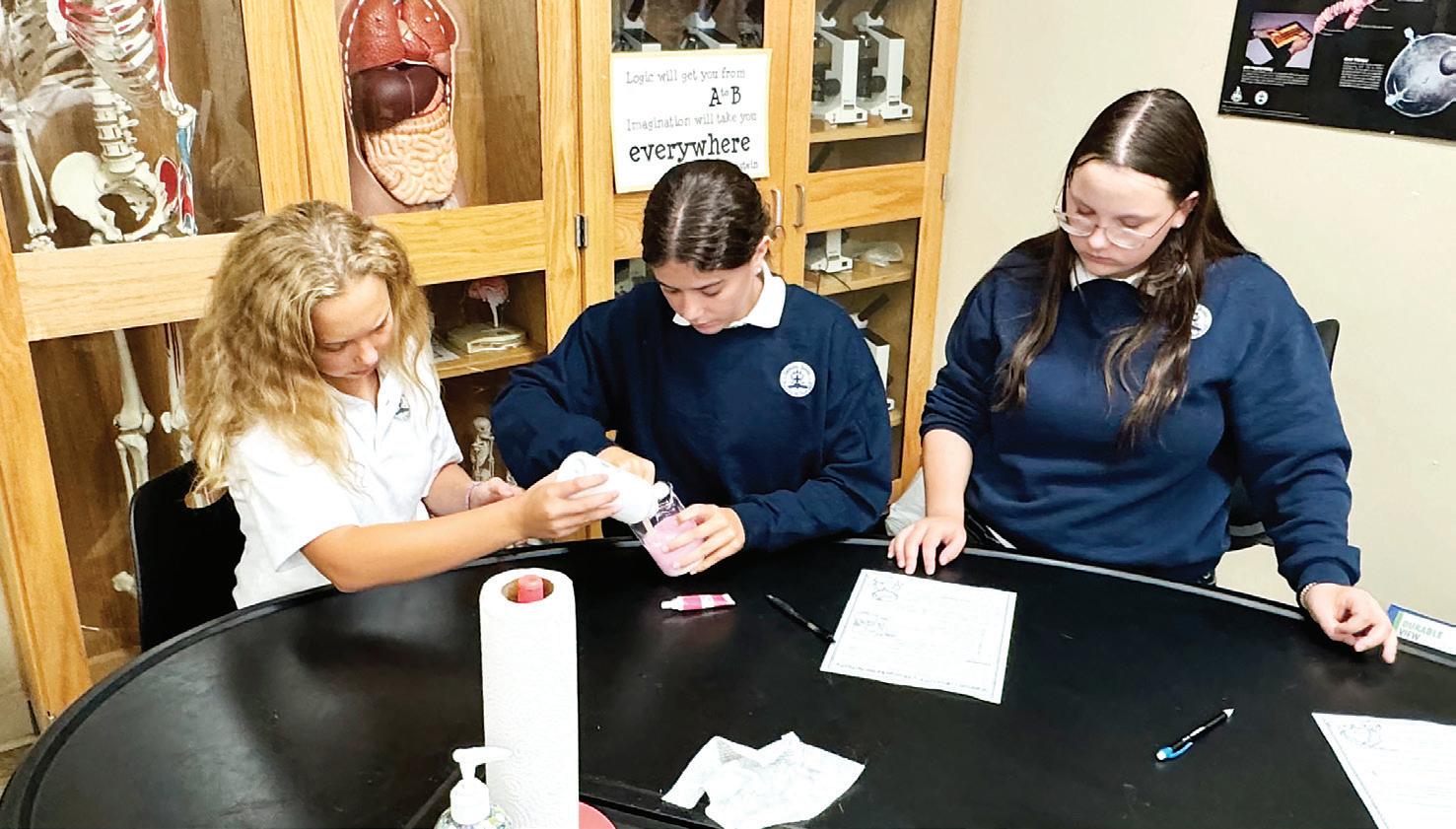
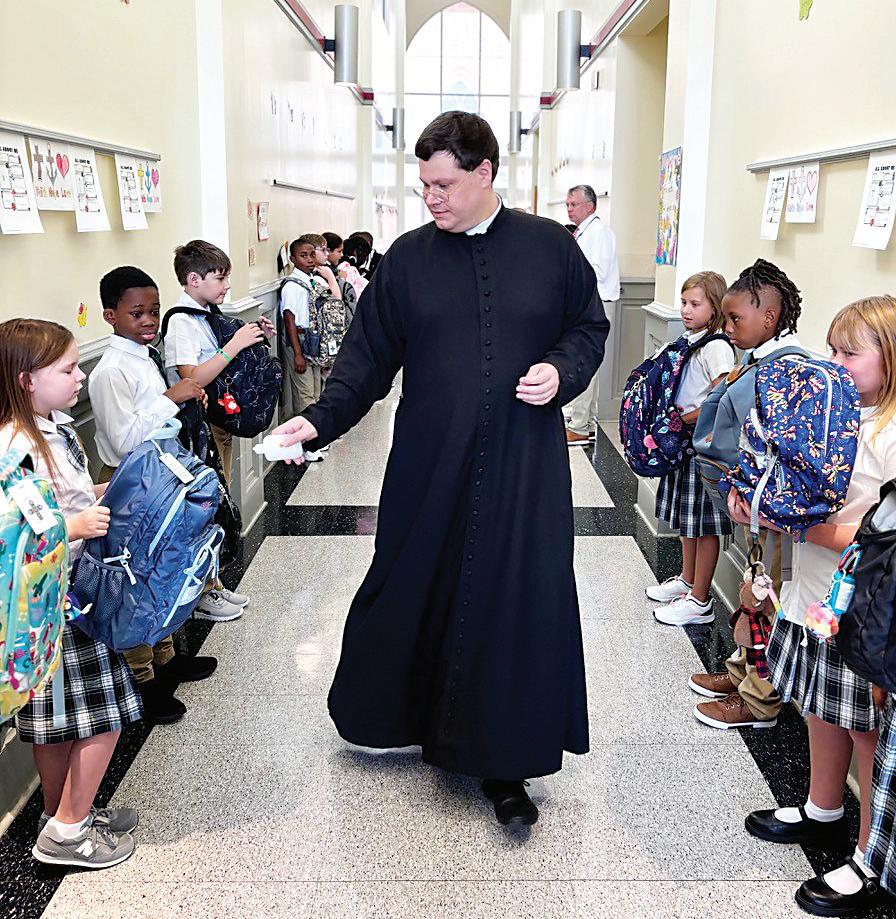


Father Carlisle Beggerly blesses fourth grade’s backpacks at St. Patrick School. Every student had their backpacks blessed as part of this annual tradition.
by Helen Reynolds)

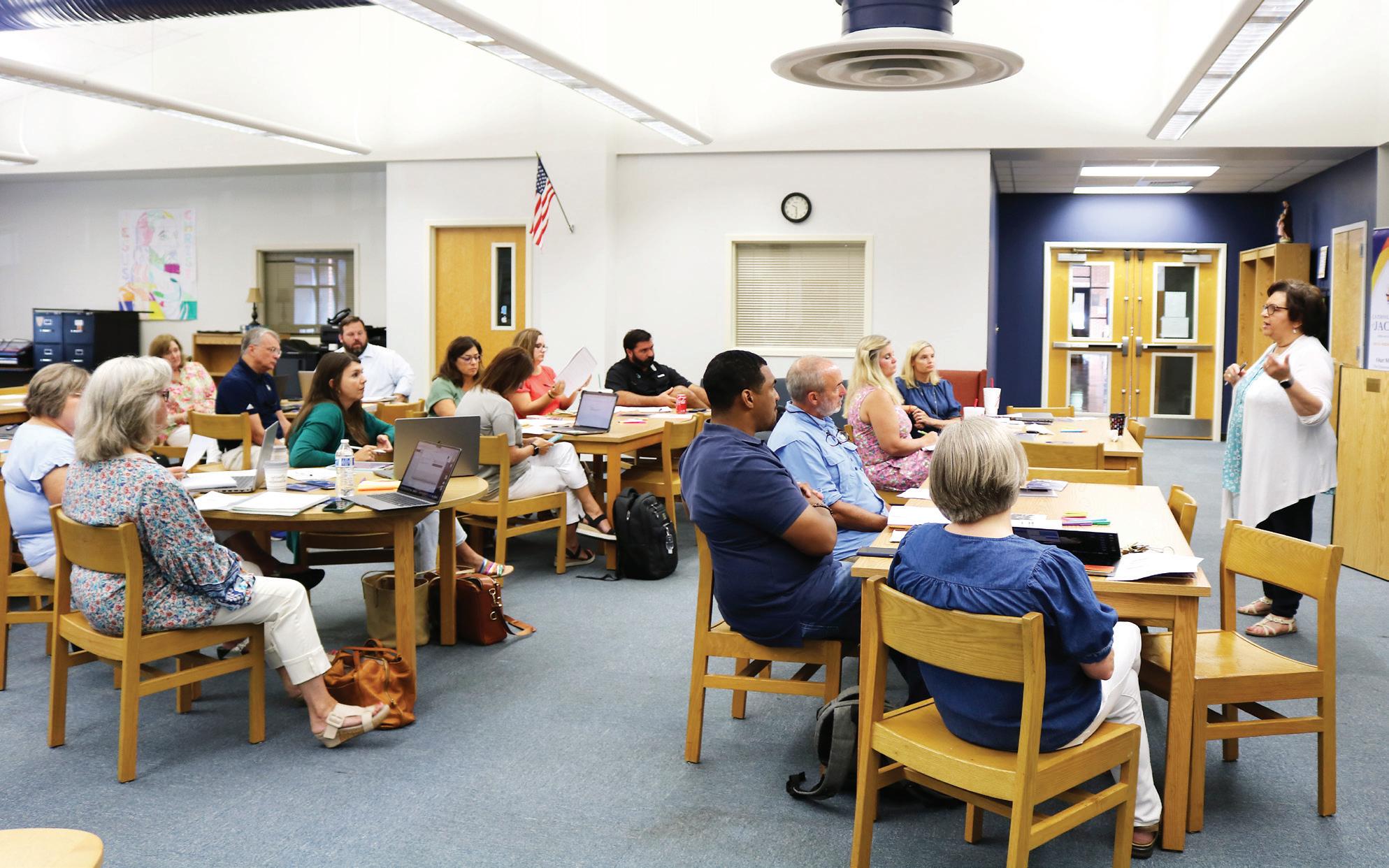
By Karla luKe
As summer vacations come to an end, we joyfully welcome our students, families and staff back to school for another year of learning, growth and community. We are excited and eager to begin a new school year full of great possibilities and the promise of fresh starts.

This year, our school community will be guided by the timeless and profound theme of “Faith, Hope and Love.” Rooted in 1 Corinthians 13:13, these three virtues are not just ideals but the very foundation upon which we build our lives as followers of Christ and most important Catholic educators. As we begin this academic journey together, we invite every member of our school family to embrace these virtues in all that we learn and do.
Faith is the foundation of our Catholic education. It is the lens through which we view our world, and it is the source of strength that sustains us through challenges. It is the trust we place in God’s providence, knowing that He walks with us in every step we take. In our classrooms, we are called to cultivate an environment where faith is not just taught but lived. This year, we will continue to fulfill our mission of providing a Christ centered environment by deepening our faith through prayer, worship and service. In our classrooms and at home, we will encourage our students to seek God in all things, to rely on Him in moments of doubt, and to trust in His plan for their lives.
In a world often clouded by uncertainty and challenges, hope is the light that leads us forward. This school year, we are committed to instilling a sense of hope in our students, reminding them that they are the future and that with God, all things are possible. Hope gives us the courage to dream big, to set goals, and to persevere even when the path ahead seems difficult. Hope is the source of our vision statement “Our Catholic schools thrive in a diverse and ever-changing world.”
Above all, we are called to love each other – unconditionally, selflessly and generously. Love is the heart of our Catholic faith, and of our Catholic school community. In every interaction, in every lesson, we will strive to embody the love of Christ, showing compassion, kindness and respect to everyone we encounter.
Service is the most outward expression of love. This year, we will place a special emphasis on service, encouraging our students to put their love into action by helping those in need, both within our community and beyond. Through acts of kindness, big and small, we will teach our students that love is not just a feeling, but a choice – a choice to live as Christ lived, to serve as He served, and to love as He loved.
Welcoming New Faces to Our School Family
As we begin this exciting new school year, we are blessed to welcome four new administrators to the Diocese of Jackson Catholic education school family. Each brings a wealth of experience, a deep commitment to Catholic education, and a heart full of love for our students and community.
Whest Shirley joins us as the high school principal of Cathedral Catholic School in Natchez. With a strong background in educational leadership, Shirley previously served as superintendent for Concordia Parish, Louisiana and principal of Concordia Parish Academy of Math, Science and Technology.
Cynthia Dixon will lead Holy Family in Holly Springs as principal. She brings her experience from Lewisburg Elementary, a national Blue Ribbon School, and Greenbrook Elementary, where her dynamic leadership will greatly benefit the Holy Family community.
Heather Ascherl is the new principal of St. Joseph Catholic Elementary School (Our Lady of Lourdes) in Greenville. Formerly a regional digital learning coordinator with the Mississippi Department of Education, Ascherl’s expertise in technology and professional development will be invaluable to the St. Joseph community.
Wendi Murray takes on the role of director at St. Paul Early Learning Center, coming from the Rankin County School District’s Early Learning Collaborative. She will be joined by assistant director Susan Irby, a long-time employee of St. Paul’s ELC, following the retirement of Jennifer Henry and Darlene Scanlon.
As we move forward into this new school year, I am filled with excitement and optimism for all that we will accomplish together. With “Faith, Hope and Love” as our guiding virtues, I am confident that this will be a year of incredible growth, learning and spiritual enrichment for all members of our community.
Thank you for your continued trust and partnership in the mission of Catholic education. I look forward to seeing the wonderful things we will achieve together this year. May God bless each of you and may His love guide us in all that we do.
Welcome back, and let’s make this a year to remember!
(Karla Luke is the executive director of Catholic Schools for the Diocese of Jackson)
Welcome our new principals

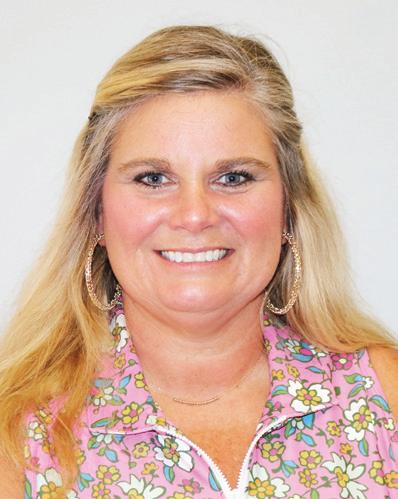
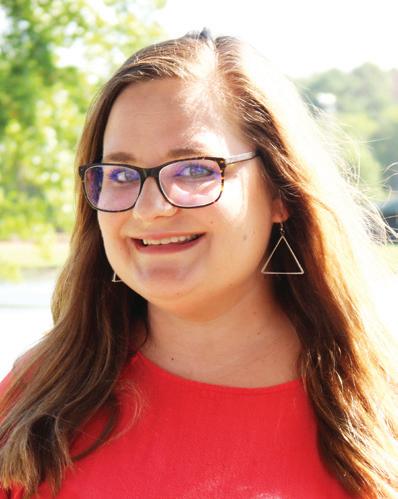
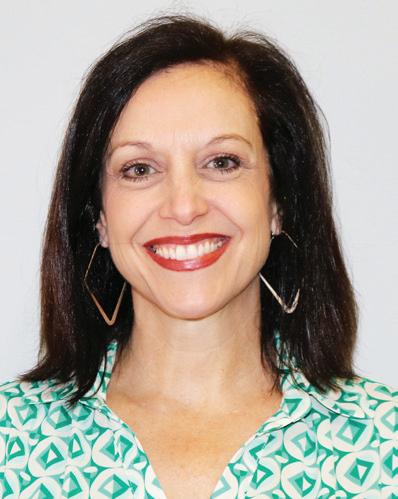
By Mary WoodWard
These articles from the archives are normally filled with items from the historical archives of the diocese. Often shared are events and stories from past bishops and some of their interesting encounters during their tenures here in Mississippi.
This week I am focusing on another aspect of my role as chancellor and archivist for the diocese – records management. Be warned this will be a little dry and technical, but that can be the life of a chancellor.
Each office in the diocese produces a lot of information and documents. Categorizing these as actual records and determining the life cycle of each type of document and piece of information is the work of a trained records manager.
So, part of my responsibilities is working with various offices to determine what information they produce, sifting the information into records and non-records, then designing a schedule of retention for those documents deemed to be records.

The Association of Records Managers and Administrators (ARMA) defines records as “Any recorded information, regardless of medium or characteristics, made or received and retained by an organization in pursuance of legal obligations or in the transaction of business.” More simply put for the chancery, a record is any piece of content (physical or electronic) created, received, or managed by the organization that is necessary to perform church ministries and activities.
Organizing these records in a basic user-friendly system that meets all levels of standards is the goal of any records manager. Managing paper records has become easier except for when there are space constraints. We have a small building on chancery property where we are storing many of these paper records, but we are methodically digitizing a lot of that paper in order to create space.
Electronic records, including email, are a beast unto themselves. Here at the diocese, we are developing a way to manage electronic or digital records by using a software platform we already have in place. We looked at a new system with lots of bells and whistles but none of those bells or whistles seemed to work with our types of records, so we started exploring what we had and how we could use that platform to create a basic electronic records management system (ERMS).
As chancellor I participated in an intensive training of the developing application that will be used specifically to adapt our retention schedules to a digital file plan that will have tags and labels for our various records in chancery offices. The main objective is to make it manageable and easy to use for our staff so that they will use it productively and efficiently.
In an effort to get email inboxes organized more intentionally, in January I began telling senior staff at department meetings that on August 1, I would be purging all inboxes of any email older than 90 days. An inbox with minimal emails sitting in it helps keep the email system moving faster.

Moving emails to designated folders such as “Bishop,” “Parishes,” “Schools,” etc. filter and sort potential records into a better filing system. Instructions on how to set up these folders in email accounts similar to their document
libraries were given at various times leading up to August 1.
As Purge Day approached many questions began to be asked on how to properly create folders and move important emails into them from the inbox. Staffers were real troopers and did a fine job even if all they did was copy their entire inbox of 40,000 emails to a backup folder so they could go through them at a more leisurely pace.
The afternoon of August 1, I used my new training to delve into our data lifecycle management system to apply a “tag” named Inbox 90Day Purge to each of our users’ mailboxes.
It was an interesting feeling to know I may have wiped out thousands of messages going back years for some folks.
Fortunately, there was a 14-day grace period to recover anything that might have been overlooked.
Unfortunately, a second similar tag I had been experimenting with got applied as well. And before I could disable it, it had wiped out a few staffers entire folder systems older than 90 days. Yikes. Fortunately, we had that 14-day grace period.
Unfortunately, all the restored emails came back into the delete folder and not into the nicely organized folders they had created. It was a good time for me to vacate the building for the weekend.
It certainly has been a learning experience, and I look forward to us transitioning to a more collaborative document and record sharing platform among our ministries so that records will be properly managed, and ministries will flourish without the worry of who has what or if the chancellor is going to purge all their files again.
(Mary Woodward is Chancellor and Archivist for the Diocese of Jackson.)
23,
WASHINGTON (OSV News) – Celebrating an Aug. 3 Mass for the Outreach 2024 LGBTQ Catholic Ministry Conference at Georgetown University, Cardinal Wilton D. Gregory of Washington stressed the need for sincere dialogue in seeking unity in the Catholic Church. “In many respects, you are engaging in an act of synodality – the vision and invitation proposed by Pope Francis that sincerely and openly speaking and listening to one another under the light and guidance of the Holy Spirit is the way that the church grows in perfection,” Cardinal Gregory said in his homily at the Mass, which was celebrated at the university’s Dahlgren Chapel of the Sacred Heart. The annual Outreach conference – held Aug. 2-4 this year – brings together Catholics who identify as LGBTQ and supporters of that community. According to the conference’s website, the gathering is held to “build community, share best practices and worship together.” The cardinal praised the Outreach conference attendees for their willingness to engage in discussions at a challenging time for the Catholic Church and the United States. Concluding his homily, the cardinal said, “The presence and the pastoral needs of our LGBTQ sisters and brothers may often be viewed as a volatile topic, but they must be faced with sincerity and genuine compassion. I pray that this conference advance that goal and make us a stronger, holier, and more welcoming church and nation.”
WASHINGTON (OSV News) – The Catholic Benefits Association filed a motion July 24 in federal court for preliminary injunction against the Equal Employment Opportunity Commission over two regulations it says violates Catholics’ religious beliefs. The group objects to two regulations issued earlier this year. One is the final regulation issued for the Pregnant Workers Fairness Act, granting workers protections for time o and other job accommodations for pregnancy-related medical conditions such as miscarriage, stillbirth and lactation – but also for abortion, which was opposed by many of the bill’s supporters, including the U.S. Conference of Catholic Bishops. The other was a provision of the EEOC’s “Enforcement Guidance on Harassment,” which CBA CEO Doug Wilson argued in a statement means that “if an employer declines to use an employee’s preferred pronouns or refuses to grant him or her access to bathrooms or locker rooms for the opposite sex, such decisions would constitute actionable sexual harassment.” Both regulations, Wilson said, “imposed mandates unacceptable for Catholic employers and never intended by Congress.” Martin Nussbaum, CBA’s general counsel at the Colorado Springs-Colorado-based First and Fourteenth law firm, explained to OSV News the Supreme Court’s recent overturning of its Chevron doctrine eliminates the courts’ deference to regulatory agencies’ interpretation of law that would have put a heavier burden on the CBA’s legal challenge. The CBA’s membership comprises Catholic dioceses, hospitals, school systems, religious orders and other entities that o er their employees insurance and benefit programs that adhere to Catholic teaching.
VATICAN CITY (CNS) – Pope Francis said he dreams of visiting China one day and, especially, praying at the Shrine of Our Lady of Sheshan near Shanghai. In an interview with Jesuit Father Pedro Chia, director of communications for the Jesuit’s Chinese Province, the pope said he also would want to meet with the country’s bishops and with all Chinese Catholics, who “are indeed a faithful people who have gone through so much and remained faithful.” Vatican-Chinese relations have been di cult for decades with the country’s communist authorities being suspicious of Catholicism as a “foreign” influence on their people. The interview, conducted
in Spanish, was filmed in the library of the Apostolic Palace May 24, the feast of Our Lady of Sheshan, also known as Our Lady Help of Christians. The Jesuit’s Chinese Province released the video on YouTube Aug. 9.
VATICAN CITY (CNS) – More than a week after the opening ceremony of the Paris Olympic Games, the Vatican joined people who complained that a segment of the show featuring drag performers o ended Christians. “The Holy See was saddened by certain scenes in the opening ceremony of the Olympics in Paris and can only join the voices that have been raised in recent days to deplore the o ense caused to many Christians and believers of other religions,” said the statement published by the Vatican press o ce late Aug. 3. The Vatican statement did not specifically identify the July 26 performance, which featured drag performers, including one wearing a crown, seated at a table in a scene that reminded many people of Leonardo da Vinci’s famous painting of the Last Supper. “In a prestigious event where the whole world gathers around common values, there should be no allusions that ridicule the religious convictions of many people,” the Vatican statement said.
MANAGUA, Nicaragua (OSV News) – At least 11 churchmen have been detained by police and paramilitaries over a weeklong assault in northern Nicaragua, depleting the already demoralized Diocese of Matagalpa – whose leader, Bishop Rolando Álvarez, lives in exile. Nine priests and a deacon were detained Aug. 1 and 2 – with some taken from parishes and parish residences – according to independent Nicaragua media. An octogenarian priest was also detained July 27 in the Diocese of Estelí, where Bishop Álvarez is apostolic administrator. “The Diocese of Matagalpa practically no longer has any clergy. We’ve been expelled, pressured and forced to flee. Parishes are on their own,” an exiled priest, familiar with the diocese, told OSV News.
“(The church) has been attacked from all sides. They’ve removed clergy, they’ve frozen its accounts. The church has survived,” he added. But he said of the ruling Sandinista regime, “Their ultimate goal is is to exterminate the diocesean church where Monsignor Rolando (Álvarez) is still bishop.” The arrests reflected the deepening repression of the Catholic Church in the Central American country, which has careened toward totalitarianism. President Daniel Ortega and his wife, Vice President Rosarillo Murillo, continue to crack down on dissent, close spaces for civil society and infringe on freedom
worship – with priests being spied upon and forced to watch their words during Mass.
SÃO PAULO (OSV News) – The Aug. 9 passenger plane crash in the city of Vinhedo, Brazil, killed all 62 on board, greatly touching di erent Catholic communities in the country. Pope Francis prayed for the victims of the crash during his Aug. 11 Angelus prayer in the Vatican: “Let us … pray for the victims of the tragic air crash in Brazil,” he said. A twin-engine turboprop plane, traveling from Cascavel, in Paraná state, to Guarulhos airport, in the São Paulo metropolitan area, crashed close to residential buildings, dropping 17,000 feet in just one minute, only 45 miles away from its destination. Many of Voepass Brazilian airline passengers lived in the region of the Archdiocese of Cascavel, which released a letter of condolences a few hours after the incident and informed that all Masses celebrated over the following three days would be dedicated to the victims. “Our Archbishop, José Mário Scalon Angonese, expresses his deepest solidarity to the families a ected by this tragedy. He joins the community in prayer and o ers his spiritual support, wishing that divine comfort can alleviate the sorrow and pain of everyone who is su ering,” the note, posted on the archdiocese’s Facebook page, read. The parish church of St. Peter the Apostle in Guaratinguetá, in São Paulo state, was also a ected by the tragedy. Local churchgoers Maria Auxiliadora Vaz de Arruda and her husband José Cloves Arruda were among the victims. Father Aloísio dos Santos Mota released a statement in order to express his special sorrow for the loss of the couple. The wife, called Dona Dôra in her church community, was known all across the region. “I’ve been her parish priest for five years, since I arrived in Guaratinguetá. She had an iconic presence in our church, a protagonism that everybody could notice,” Father Mota told OSV News.
The Diocese of Jackson is committed to ensuring that no one being served by the church be (is) at risk of sexual abuse or exploitation by clergy, religious or lay church personnel. The spiritual well-being of all the victims, their families and others in the community is of particular concern to the church. In accordance with our policy, all victims are o ered counseling and pastoral care.

Anyone who has been a victim of abuse or exploitation by clergy, religious or lay church personnel and has not yet reported it is encouraged to do so. Our victim assistance coordinator, Erika Rojas, a licensed social worker, is available to assist in making a report. Please contact her at (601) 326-3736.




For more information about diocesan policies and procedures and to learn what the diocese is doing to create a safe environment for everyone, please visit the diocesan website at www.jacksondiocese.org and click on “Protection of Children.”


To report an allegation of abuse or mishandling of allegations of sexual abuse by a bishop, please visit https://reportbishopabuse.org.





+Joseph R. Kopacz D.D., Ph.D. Bishop of Jackson

By Father LincoLn DaLL
On the week of July 8, I arrived on the beautiful campus of the University of Notre Dame in South Bend, Indiana to conclude my participation in the Mathis Liturgical Leadership Program, the culmination of a two year journey. In the inaugural cohort of this program, eighteen of us have been focusing the past two years on projects dedicated to fostering a Eucharistic culture in our parishes, dioceses, Catholic schools, and communities in conjunction with the Eucharistic revival in the United States.

For these past two years, my project has been focused on developing the Catholic prison ministry around the Eucharist at the Central Mississippi Correctional Facility (CMCF) in Pearl.
Back when I started this project in the summer of 2022, we were just recently granted access again to the inmate population after the pandemic lockdown. We struggled to get into the prison to celebrate Mass with the men, only seeing them once or twice a month at best. We often had to meet in the foyer of a building or at the prison fire station or outside the prison cafeteria on a picnic bench with pigeons lurking overhead. However, we never gave up on this ministry even in the midst of many roadblocks and challenges.
Finally, in the spring of 2023, we were granted access to the main chapel at the prison where we were able to celebrate Mass weekly with the men there. We now have altar servers, lectors, a Eucharistic minister, and ushers, just like any other parish in our diocese. We even have a tabernacle now at the prison chapel, with Jesus being present with them in the Blessed Sacrament every moment of the day.
We also have men in our Catholic community

who visit the other inmates on pastoral visits and who invite them to join us for Mass and for our other activities. We form the men to see themselves as Eucharistic missionaries, living out the spirit of the Eucharist in the harsh prison environment. The Lord has blessed us in abundance with this vibrant ministry in which we sometimes have four different Masses in a week and in which more than 20 men have entered the church through the RCIA program this past year.
I was so excited to present my project about our prison ministry on that recent visit to the Notre Dame campus. My classmates and professors have been so supportive of our prison ministry. In conjunction with my presentation, I presented two vid-

eos prepared by the inmates themselves, showing the history of our Catholic prison ministry and giving testimony as to how many lives have been transformed. My professors and classmates were very enthusiastic about the progress of our prison ministry and about the Eucharist being at the center of all we do.
Dr. Tim O’Malley, the professor at the heart of the Mathis Liturgical Leadership program, believes that the success of the Eucharistic renewal will hinge upon the way we implement at Eucharistic culture on the local level. Our Catholic prison ministry is in the process of writing a memoir about our experiences of forming a Catholic community behind bars. We also are in the process of getting more formation for the men in leadership positions in our ministry through the Catholic Distance University and through our diocese’s catechist certification program. We are also implementing a garden project, in which the men will learn gardening techniques and skills that they will be able to take home to their families when they are released from prison.
I have been involved in prison ministry for the sixteen years I have been a priest, ever since I received a letter from an inmate in the Hinds County Detention Center in Raymond requesting a visit from me. It amazes me how the humble beginnings of this ministry have now developed like the small mustard seed growing into a huge plant in Mark’s Gospel. I am grateful to the Mathis Liturgical Leadership Program of the University of Notre Dame, of the way that program has helped our Catholic prison ministry at CMCF flourish with so many blessings from God.
(Father Lincoln Dall is vicar general for the Diocese of Jackson and pastor of Holy Savior in Clinton and Immaculate Conception in Raymond.)
BY MELVIN ARRINGTON
Why does no one want to talk about sin these days? Why do people refuse to admit to wrongdoing anymore. The prevailing philosophy seems to be one of “I’m okay; you’re okay.” However, Scripture teaches that “if we say we have no sin, we deceive ourselves, and the truth is not in us.” (I John 1:8) We are all guilty as charged, every single one of us: “All have sinned and fall short of the glory of God.” (Romans 3:23)

No matter how we classify it, sin involves disobedience; it is a transgression of God’s law. Some infractions are minor (venial); others sever our relationship with God and put our souls at risk (mortal). For the sin to be considered mortal it has to meet all of the following criteria: 1) it must involve grave matter, for example, when a person breaks one of the Ten Commandments or fails to perform works of charity as specified in the 25th chapter of Matthew; 2) the person must have full knowledge and awareness of the seriousness of the matter; 3) he must give full consent to what he is about to do; that is, his will must be unimpaired. At the risk of oversimplification, we might say that the mortal category applies when it deals with doing something that’s really bad, and the person realizes how serious it is, and he goes ahead and does it anyway. Not all our faults involve actions we take. They can include our thoughts and words as well. And when we recite the Confiteor, we acknowledge that we are responsible not only for the things we have done but also for what we have failed to do.

During the early Christian centuries, several attempts were made to catalog what became known as the seven deadly sins, also called the seven capital or cardinal sins. Evagrius Ponticus, a monk who lived in the fourth century, put together the first list, including in his compilation what he called eight evil thoughts that lead us into temptation. Others who followed in Evagrius’ footsteps produced registers alternating between seven and eight sins. At the end of the sixth century Pope Gregory I (Gregory the Great) composed a list of seven items that closely resemble the modern-day canon of deadly vices: anger, envy, lust, pride, gluttony, sloth and greed. Although the names used for denoting each of these may have varied across the ages, the transgressions themselves have remained the same. As Archbishop Fulton J. Sheen has remarked, there are no new sins; there are only new sinners.
Why do we sin in the first place? It’s because we’re all searching for happiness. But many are searching in all the wrong places. Instead of discovering the joy and contentment that come from having a
courtesy of BigStock
deeply committed personal relationship with Jesus Christ, they grasp at the things the world has to o er – wealth, power, pleasure, fame, etc. These usually result in only short-term gratification and long-term unhappiness.
Every sin is an excess or a defect of something that is good. Not surprisingly, much of our modern secular culture is characterized by excess, self-absorption and perversion of the good. It tells us that the classic vices are not bad at all. In fact, they can be very good. What’s wrong, they say, with trying to get even with your enemy? Why feel guilty about accumulating as much wealth as possible without concern for the needs of the poor? What harm is there in having an occasional a air as long as no one gets hurt? What’s wrong is that in each case the ego is out of control. When the predominant attitude is one of “it’s all about me,” concepts such as forgiveness, generosity and sacrificial love get shoved out of the way. So, how do we protect ourselves from enticements that may lead us astray?
For a start, we can pray for an extra measure of grace to fight o temptation and make a conscious e ort to avoid the near occasions of sin, that is, the things and places that can lead us away from God and His church. In addition, we should pray to St. Michael: “St. Michael the Archangel, defend us in battle. Be our protection against the wickedness and snares of the devil.” And then we should
follow up our prayers by putting them into action, for example, involving ourselves in a variety of charitable activities.
Bishop Robert Barron recommends practicing what he calls the seven lively virtues in order to cancel out the deadly vices. In other words, we should counterbalance anger with forgiveness, correct envy with admiration, exchange lust for chastity, rectify pride with humility, renounce gluttony in favor of temperance, counter sloth with zeal, and replace greed with generosity. Performing these virtues will loosen the bonds of sin and allow us to once again experience the love of God flowing through us.
Imagine an oblong box with anger, envy and lust aligned along one side, pride positioned at the head, and gluttony, sloth and greed stationed along the other side. The box represents a co n; inside lies the soul. These deadly vices are, in the words of Archbishop Sheen, the “seven pallbearers of the soul.” They lead us down, down into darkness, down into the depths of sadness and despair, down, down to the death of the soul!
Our contemporary culture tries to pound into us the notion that the virtues are old-fashioned and out of step. But we know better. We know that by praying and doing good works we can, through the grace of God, cancel out those vices that pose the greatest threat to our spiritual wellbeing. If we follow the virtues, they will become for us stepping stones leading upward – up to peace and contentment, up to the attainment of our heart’s innermost desire, up to everlasting joy, up, up to God!
(Melvin Arrington is a Professor Emeritus of Modern Languages for the University of Mississippi and a member of St. John Oxford.)


By OSV NewS
(OSV News) – Among American Olympians
achieving a spot on the podium in Paris are Catholics who have expressed their dependence on faith over the years as they’ve pursued excellence in their athletic pursuits.
Swimmer Katie Ledecky is outspoken about how her Catholic faith guides her life.
On Aug. 3, Ledecky became the most decorated American female gold medalist in any sport as well as one of only two women from any nation, in any sport, to win nine gold medals. It was her fourth consecutive Olympic gold medal in the 800 freestyle. She has 14 medals total. Just two days earlier she won her 13th Olympic medal – in itself historic. She took silver in the 4x200-meter freestyle relay.
After the 2021 Olympic games in Tokyo, the Catholic school graduate told the Catholic Standard, the Archdiocese of Washington’s newspaper, that she prayed the Hail Mary before each race to calm her nerves, just as she had during the 2012 and 2016 Olympics.
“My faith remains very important in my life, especially the last two years,” Ledecky told the Catholic Standard in 2021. She noted that watching livestreamed Mass, celebrated by her godfather Jesuit Father Jim Shea at a parish in Charlotte, North Carolina, helped her through the pandemic.
“My faith is strong, and I realized more how important that is,” she said.
Ledecky, 27, has nine gold, four silver and one bronze Olympic medals. In Paris, she is teammates with two fellow alumnae of her all-girls high school, Stone Ridge School of the Sacred Heart in Bethesda, Maryland: Phoebe Bacon and Erin Gemmell. Gemmell medaled alongside Ledecky with the 4x200 meter relay.
Ledecky and Bacon also attended the elementary Little Flower School in Bethesda, where both families are members of the parish.
They are among a host of U.S. Olympians who are Catholic, were raised in the faith, or attended Catholic schools or colleges and are now competing in Paris. Several have spoken in the past about the role their faith has played in their training and shaped their self-perception.
U.S. Olympic gymnast and Paris gold medalist Simone Biles, who was raised Catholic and in years past spoke about the role of faith in her life, has said she credits God for her success.
The high-flying 27-year-old, who trains in Spring, Texas, at her World Champions Centre gym, said in the past that when she travels, she sometimes takes
with her a statue of St. Sebastian, the patron saint of athletes, and she also carries a rosary her mother gave her. Her parents have told media that they often pray the rosary for Simone. Biles and her family have also been known to attend St. James Catholic Church in Spring.
Biles, who won gold in the women’s gymnastics allaround competition in Paris Aug. 1 and helped lead the U.S. women to a team gold July 30, made those comments to Us Weekly in 2016.

“I never thought I’d be who I am,” she told Vanity Fair in a story published in January, “but look at God’s blessings.”
In recent years, Biles has been more private about her faith journey. In 2021, she diverged from church teaching on abortion access, saying on Twitter (now X) that she was “very pro-choice” arguing “you should not control someone elses body/decision.”
However, Biles has also been outspoken about addressing and prioritizing mental health, an issue the U.S. bishops have sought to raise with the National Catholic Mental Health Campaign. Following the pandemic-delayed Tokyo Olympics, Biles (a survivor of sexual abuse perpetrated by Larry Nassar, a USA Gymnastics’ national-team doctor) publicly admitted that she struggled with her mental health and athletics. At the time, she had stepped out of the Olympic competition after experiencing the “twisties,” a sense of disorientation when in motion that could lead to serious injury.
In Paris, however, Biles has exuded confidence

– publicly thanking her therapist for routine care – and her dedication to her sport has paid off, with many calling her the “greatest of all time.” She is now the most decorated U.S. Olympic gymnast in history, with nine Olympic medals.
Ryan Murphy, a Catholic swimmer who grew up in Florida, is taking home a bronze medal in the men’s 100-meter backstroke. In a 2016 interview with the National Catholic Register, he described the importance of having an active prayer life and living out his faith. He said, “I’m a firm believer in God. My faith is important to me. There are, however, times when I rely on him more than others. Overall, I am private in my spirituality.”
Murphy, 29, drew the spotlight in Paris not only for his race, but for the sign his wife, Bridget, held up as he was walking to the podium: “Ryan it’s a girl!” The couple, who married in September, are reportedly expecting their first child in January.
A former altar boy, Murphy described his family to the Register as ardent supporters of Catholic education. The story described him as having “a great devotion to St. Christopher, the patron saint of swimmers.”
He garnered attention during the 2016 Olympics in Rio de Janeiro – where he won three gold medals –after genuflecting following a swim.
“I believe God has given me a great talent, for which I’m eternally grateful,” he told the Register at the time. “My faith gives me comfort despite the outcome of a race. I ultimately believe – I know – God has a larger plan for me.”
(Staff of the Texas Catholic Herald also contributed to this story.)
U.S. women’s 4x200-meter freestyle relay silver medal winners Erin Gemmell, Katie Ledecky, Paige Madden and Claire Weinstein, celebrate on the podium after winning Aug. 1, 2024, during the Olympic Games at Paris La Defense Arena. Gemmell and Ledecky are graduates of Stone Ridge School of the Sacred Heart in Bethesda, Maryland. (OSV News photo/Evgenia Novozhenina, Reuters)



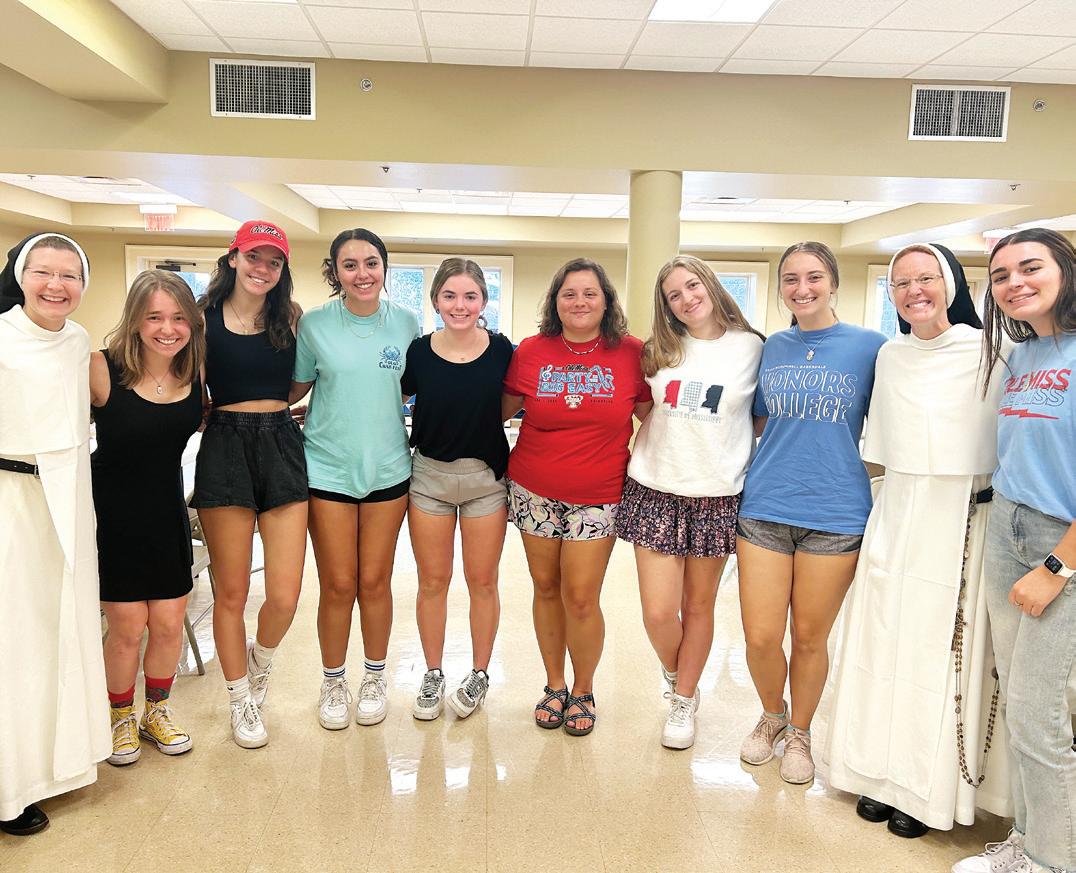

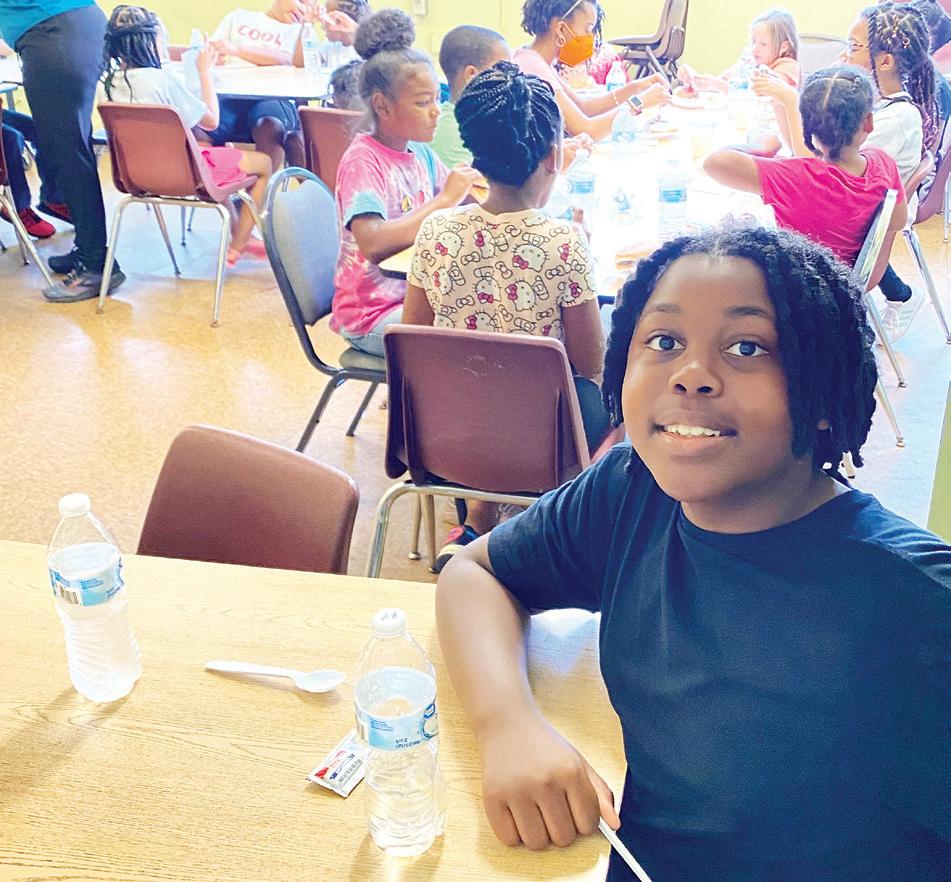





Since 1972, the DIOCESE OF JACKSON has been partnering with Catholic Extension to build the faith in central Mississippi. Join us and together we can build and repair churches, strengthen and grow essential ministries and support our lay and ordained leaders.



















AUGUST 23, 2024
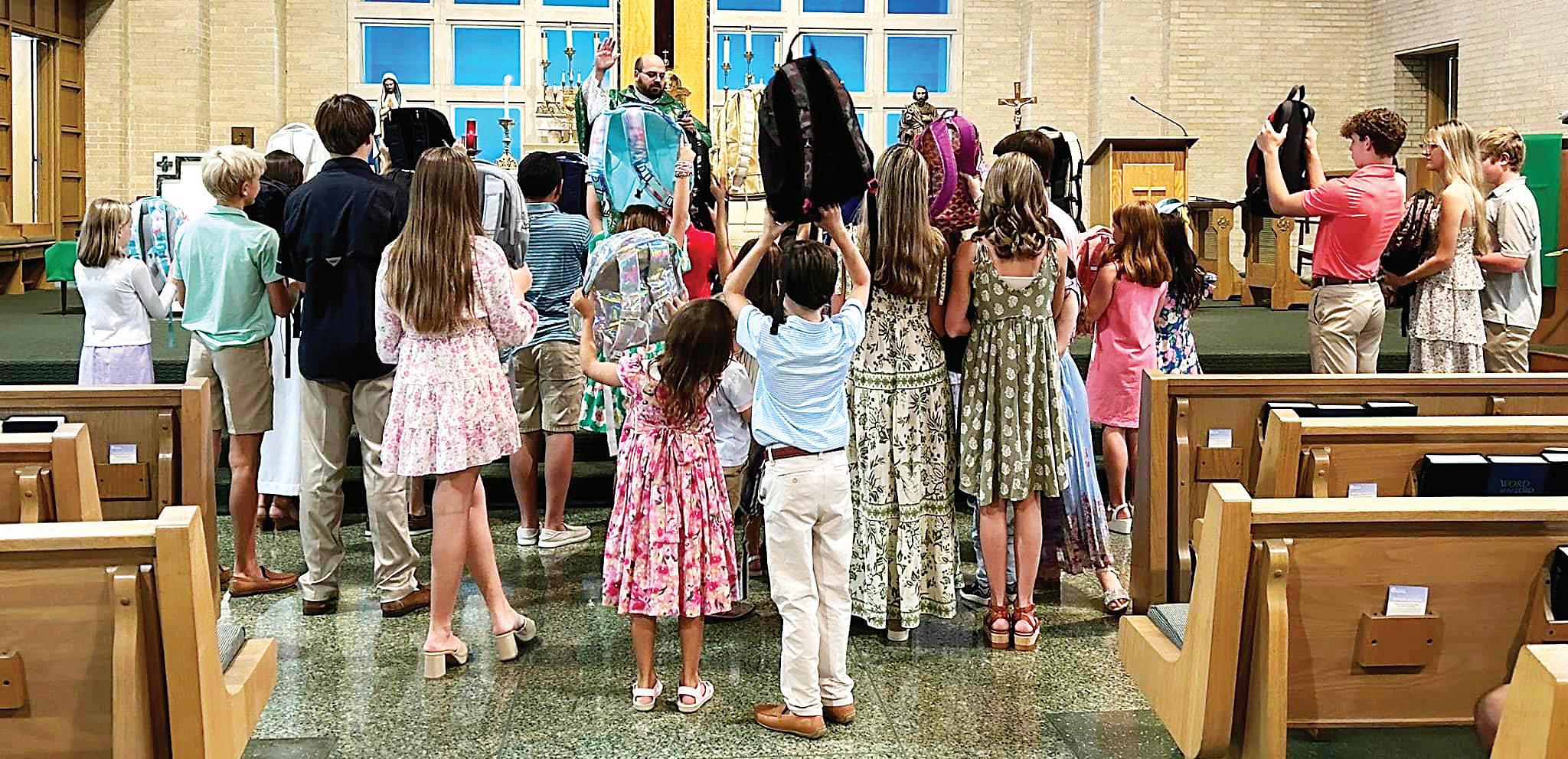
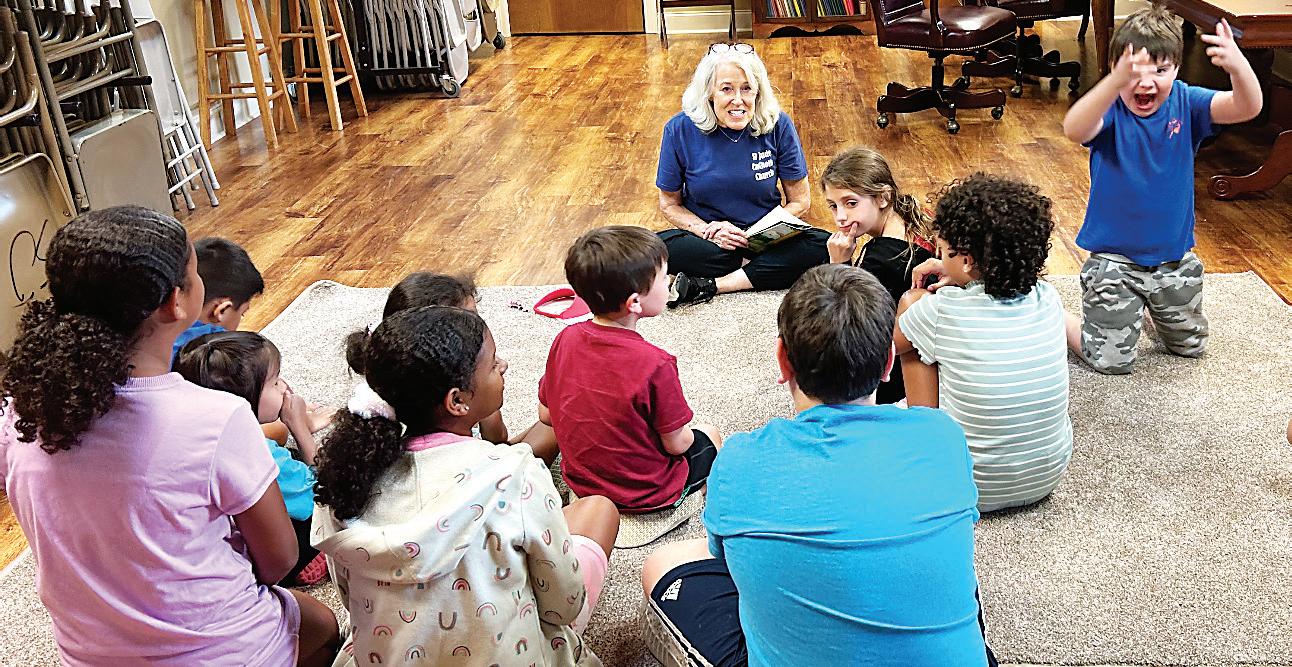

Church had a grand time celebrating VBS from July 1519. The theme was “God is Surely Alive,” a take-off from the “Chronicles of Narnia” storyline. Many themes from the Narnia story were reenacted and compared to the story of Christ. Youth learned about being strong and courageous, being called to a great mission, forgiving and “let it go”, and finally ... God’s not dead, He’s surely alive! (Photo by Rhonda Swita)



By Staff RepoRtS
MADISON – Join the Catholic Foundation for a fantastic day of golf and community spirit at the 42nd annual Bishop’s Cup Golf Tournament, on Thursday, Sept. 12, at Lake Caroline Golf Club. This event welcomes golfers of all skill levels – men and women alike – for a day filled with fun, competition and camaraderie.
Whether you’re a seasoned pro or a newcomer to the game, there’s something for everyone.
Tee time is set for 1 p.m., and players can sign up as individuals or with friends. The cost per player is $200, while priests enjoy the game for free. Excitement is high with a hole-in-one prize of $10,000 up for grabs!
Each golfer will enjoy a delicious lunch before the tournament; 18 holes of golf with cart; snacks and beverages on the course; a golf hat; and dinner, with two free drink tickets at The Mermaid Café.
For those who prefer not to golf, dinner tickets are available for $40 per person. The evening will feature a silent and live auction, providing additional opportunities to support a great cause.
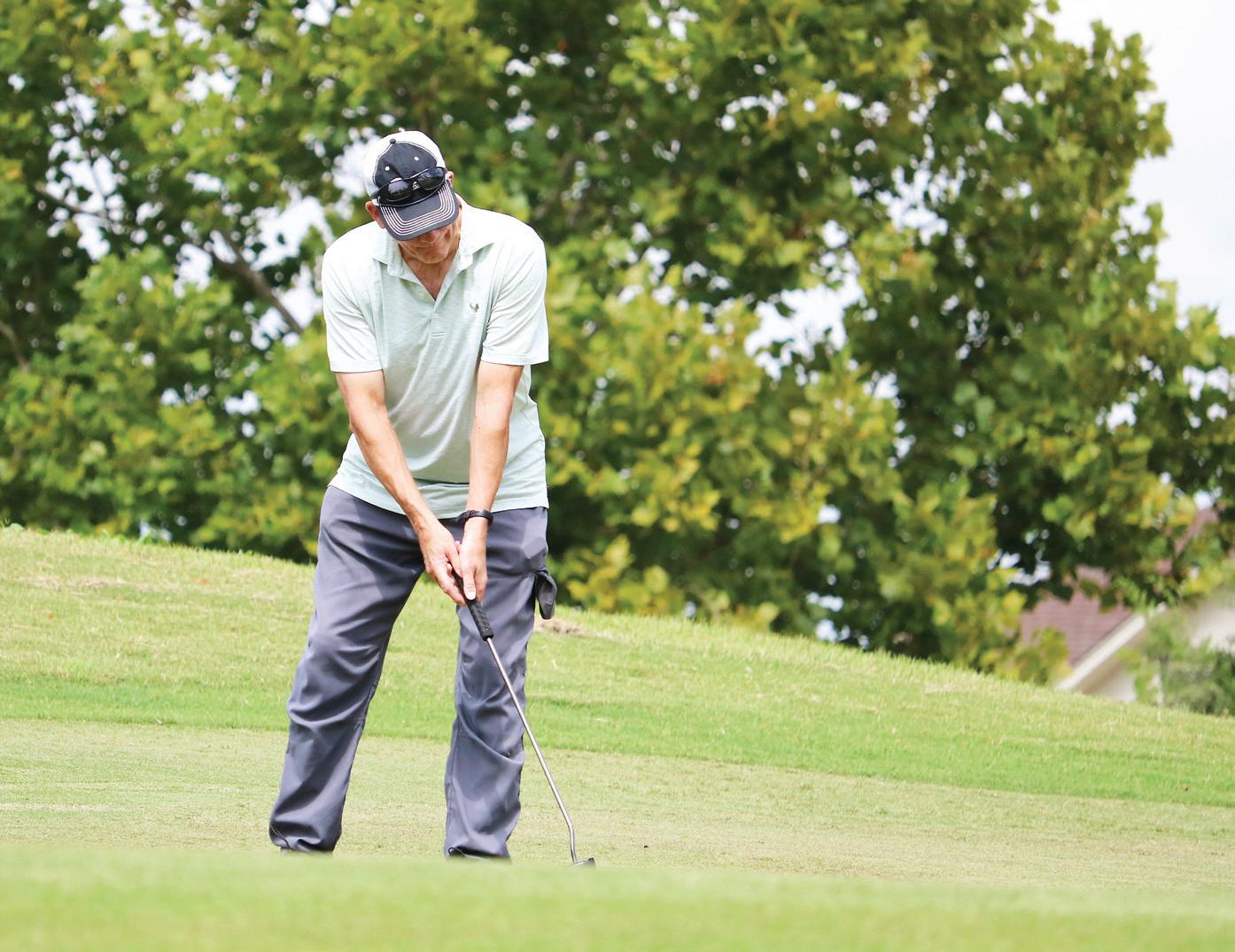
MADISON – Bishop Joseph Kopacz sets up for a putt at a past Bishop’s Cup Golf Tournament. This year, the tournament is set for Thursday, Sept. 12 at Lake Caroline Golf Club. Registration information is available at bit.ly/BishopsCup2024. (Photo by Joanna King)
Rebecca Harris, executive director of the Catholic Foundation, shared her enthusiasm for this year’s event. “The tournament’s growth each year is truly exciting, and we eagerly anticipate seeing our golfers return. We extend our heartfelt thanks to all those who sponsor holes and contribute to making the event a success.”
The Catholic Foundation plays a vital role in supporting grant projects across the diocese. The proceeds from this year’s tournament will benefit the Catholic Foundation Grant Trust, which will fund future grant projects throughout the diocese. Past projects have included parish renovations, school safety identification cards and blinds, and the Diocesan Catholic Youth Conference just to name a few.
Sponsorship opportunities are available at various levels. To become a sponsor or to register online, visit bit.ly/ BishopsCup2024. The Bishop’s Cup Golf Committee is also actively seeking items for their silent and live auctions. If you would like to contribute an auction item or organize a group of friends to assemble a special auction package, please reach out to Rebecca Harris at (601) 9608477.
Steve Carmody, who has chaired the event for the past 32 years, expressed his gratitude for the continued support: “We invite golfers from across the diocese to join us for a day of enjoyment and community. Our sincere gratitude goes out to all our golf and silent auction sponsors whose support is crucial to the success of this event. We look forward to seeing Bishop Kopacz and many familiar faces this year.”
The Bishop’s Cup committee is eager to make this year’s event a memorable one.
